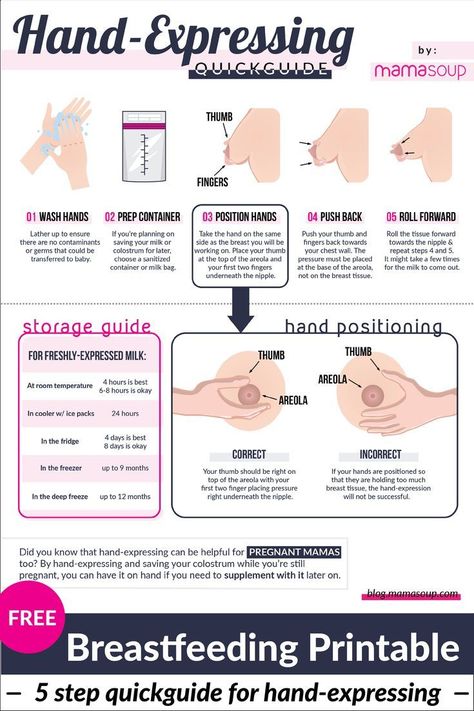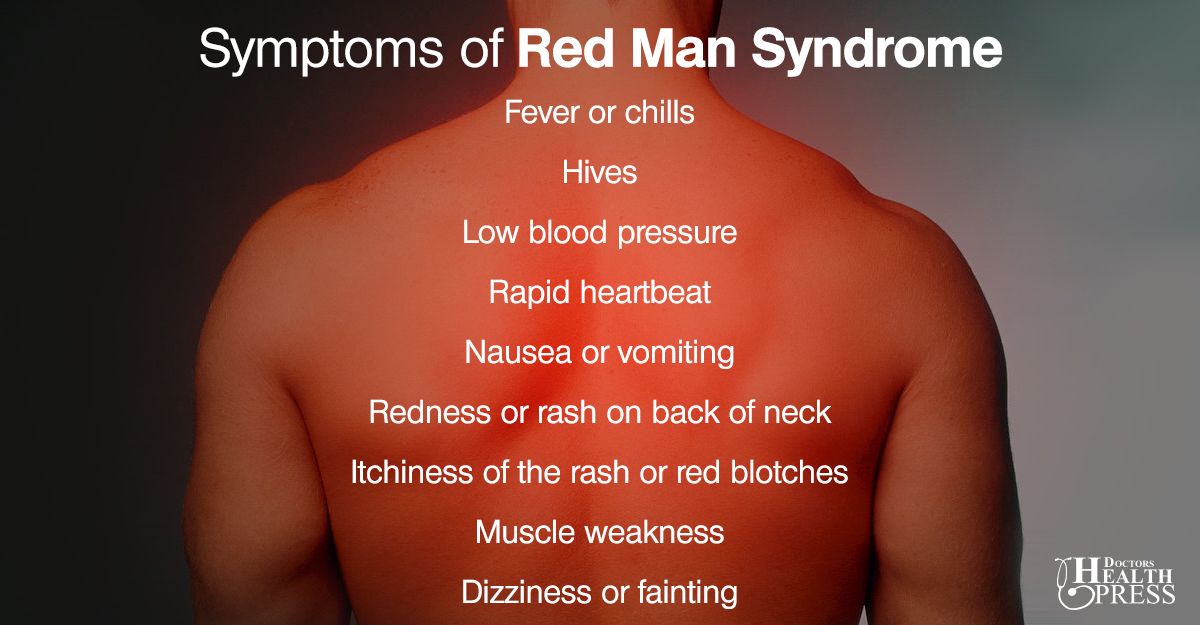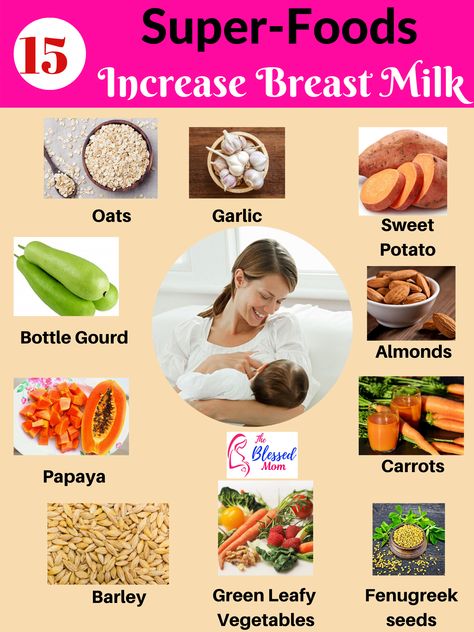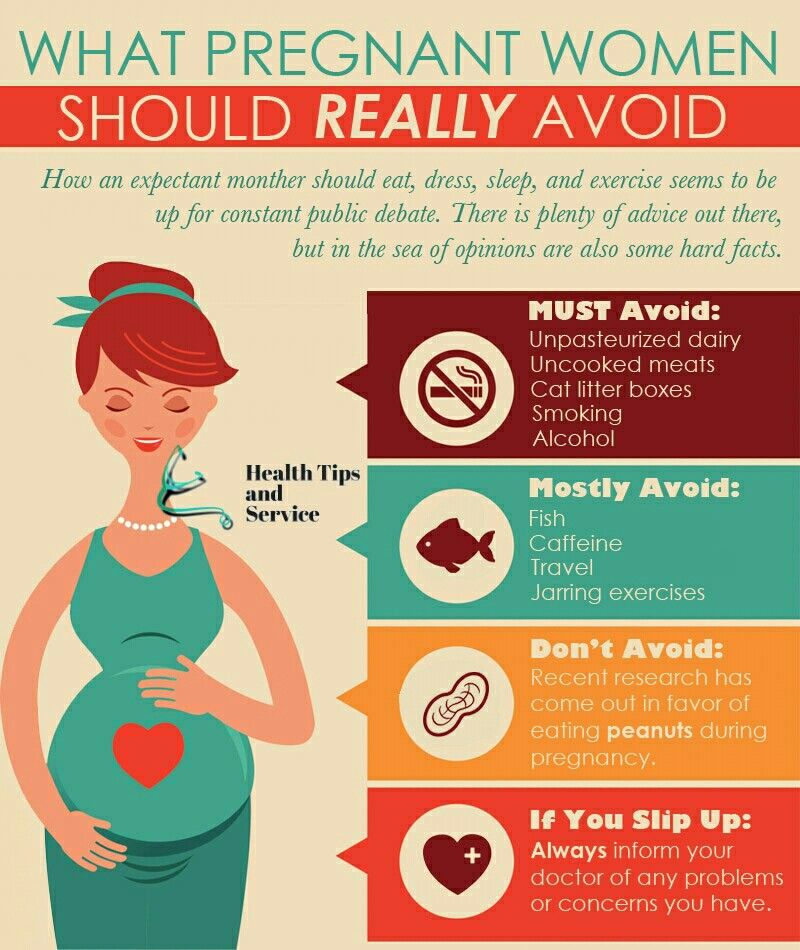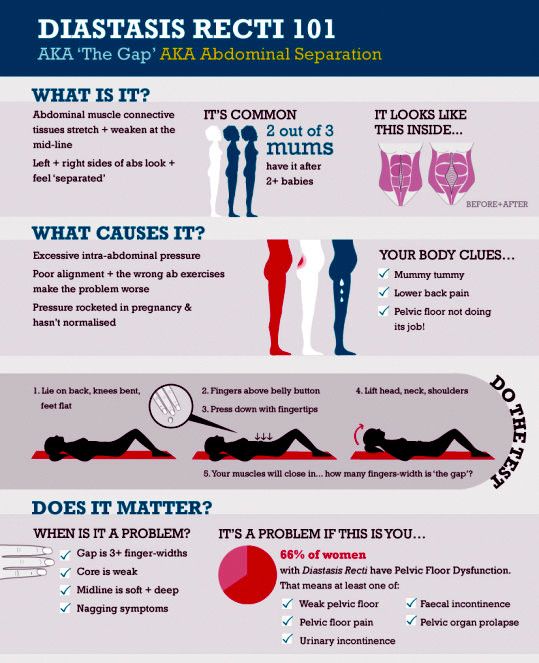Pregnancy the first three months
First Trimester Of Pregnancy: What To Expect
What is the first trimester of pregnancy?
Pregnancy has three trimesters or stages. Each trimester is about 13 weeks or three months long. A full-term pregnancy lasts 40 weeks or between nine and 10 months. Your healthcare provider will talk to you about fetal development in terms of weeks. Your first trimester of pregnancy lasts until the 13th week of pregnancy.
It may seem strange, but your pregnancy actually begins on the first day of your last menstrual period. This is called the gestational age of the pregnancy. A pregnancy care provider calculates your due date by adding 40 weeks to the first day of your last menstrual period. So this means, by the time you know you’re pregnant, you’re already about four weeks along. This can be very confusing!
Understanding weeks of pregnancy
The first two weeks of pregnancy are part of your normal menstrual cycle — the first week is your period and the second week is ovulation. Once you ovulate, your egg travels through your fallopian tube to your uterus. If it meets up with sperm, they combine and conception occurs (fertilization).
During the third week of pregnancy, the fertilized egg travels to your uterus. On its way down to your uterus, it divides into more cells. Once it reaches your uterus, it implants into your uterine lining. This triggers your body to recognize that you’re pregnant and a series of changes begin to happen. Most people miss their period and then get a positive pregnancy test.
How long is the first trimester?
The first trimester begins before you’re pregnant. It starts on the first day of your last menstrual period and goes until the 13th week of pregnancy.
What can I expect in my first trimester?
Your first trimester of pregnancy is full of many physical and emotional changes. It can be a very overwhelming time, and your mind may be racing with questions. Plus, your hormones are in overdrive. In fact, your body produces more estrogen during one pregnancy than it does during your entire life when you’re not pregnant. This surge in hormones can cause some unpleasant pregnancy symptoms. You may find yourself feeling moody, bloated and tired. While you may not see a prominent baby bump yet, your uterus is expanding and your blood volume is increasing.
This surge in hormones can cause some unpleasant pregnancy symptoms. You may find yourself feeling moody, bloated and tired. While you may not see a prominent baby bump yet, your uterus is expanding and your blood volume is increasing.
It’s OK to feel both excited and nervous. Talking to your friends, partner or a healthcare provider may help you feel better as you navigate your pregnancy journey.
What should I do in my first trimester?
Your first trimester is very important. You might not look or feel pregnant, but lots of changes are happening.
If you don’t have a healthcare provider or a pregnancy care provider, you should find one as soon as possible. Getting early pregnancy care can help you avoid any potential complications. Make a list of questions or concerns you have so you’re ready for your first appointment. Check with your health insurance about pregnancy coverage so you know what to expect and where you can get care. If you don’t have health insurance, there are programs and agencies to help you get prenatal care.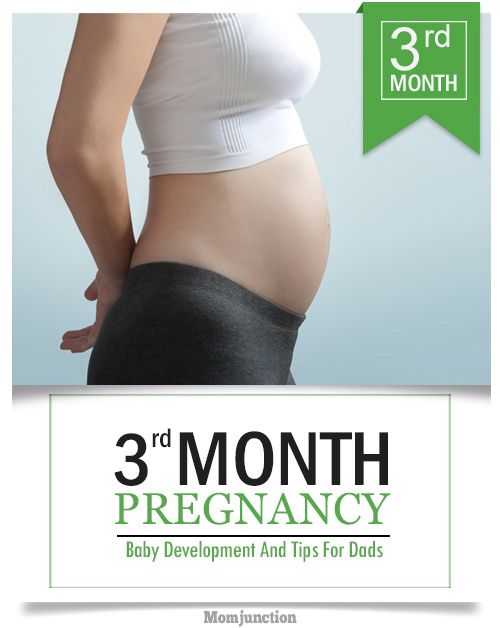
There are different types of pregnancy care providers that take care of you during pregnancy, labor, delivery and postpartum. These include obstetricians, midwives, and sometimes, primary care physicians. In addition to selecting a pregnancy care provider, you may also consider places to deliver your baby. While most people choose to give birth in a hospital, some people prefer birthing centers or home births.
Now is a great time to think about your overall health and what lifestyle changes you may need to make now that you’re pregnant. For example, think about how pregnancy affects your work, finances, habits and daily activities.
How does the fetus develop in the first trimester of pregnancy?
Several developments occur in the first trimester. Although you can’t see it happening, there’s a lot going on inside your body after sperm fertilizes an egg.
Weeks one to four of pregnancy
During the first month of pregnancy, several important structures form.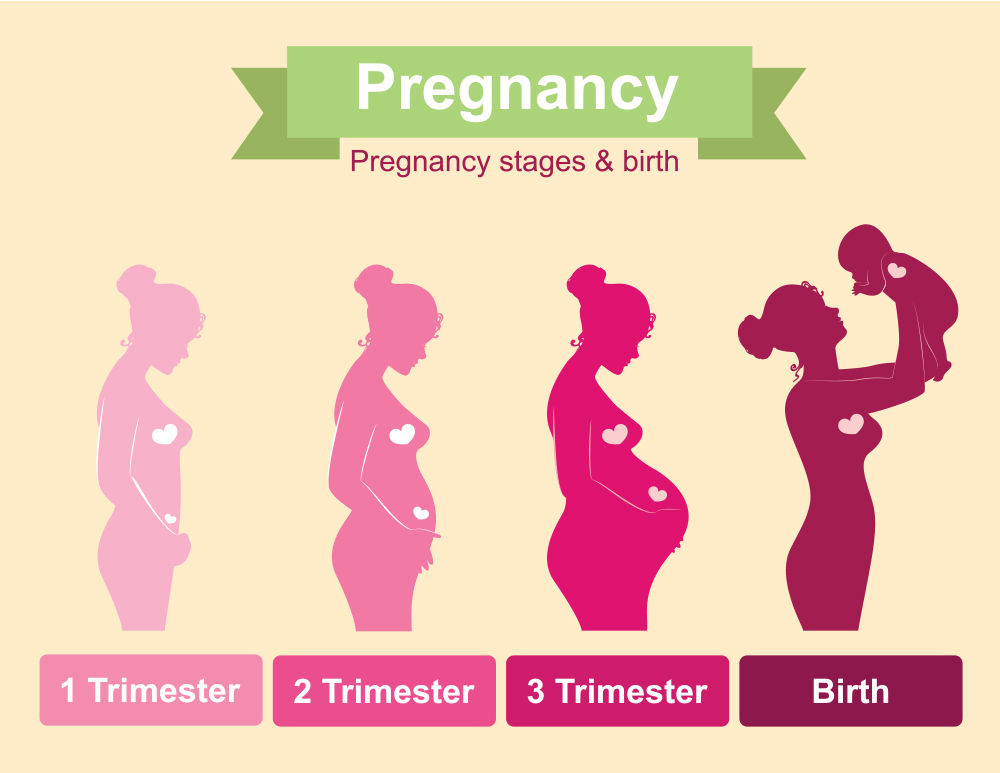 These structures are a tiny clump of cells, but will grow to become the amniotic sac, placenta and umbilical cord. A tube that becomes the fetus’s brain and spinal cord forms, as well as its circulatory system. A face, circles for eyes and the beginning of a mouth take shape.
These structures are a tiny clump of cells, but will grow to become the amniotic sac, placenta and umbilical cord. A tube that becomes the fetus’s brain and spinal cord forms, as well as its circulatory system. A face, circles for eyes and the beginning of a mouth take shape.
The embryo is about a quarter-inch inch long — smaller than a grain of rice.
Weeks five to eight of pregnancy
Several major organs begin to develop during the sixth week of pregnancy including the fetal lungs, heart, ears, arms and legs. Bones begin to replace tissue. Its head is large in proportion to the rest of its body, but it look more human now. The fetus has a distinct mouth, nose and face. Some providers do an early ultrasound to confirm a heartbeat during this time.
By the end of the eighth week of pregnancy, the embryo becomes a fetus. It’s about 1 inch long or the size of a raspberry.
Weeks nine to 12 of pregnancy
Towards the end of your first trimester, the fetus will have toes, fingers and nails.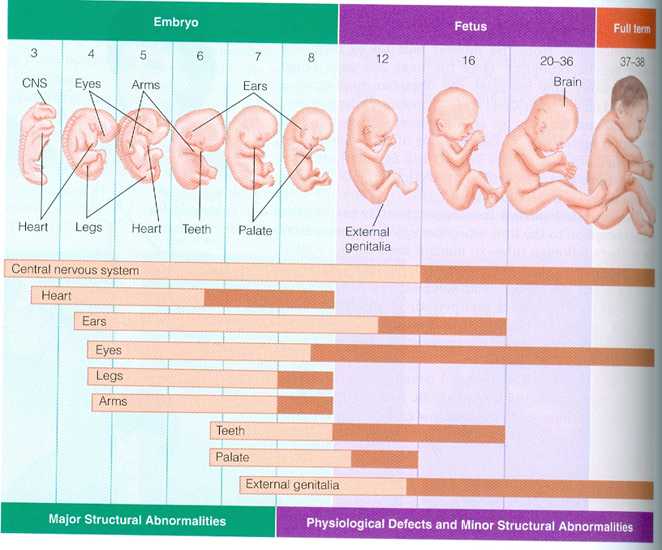 It will start to move by opening and closings its hands and mouth. The fetus’s urinary and digestive systems are also fully functioning. At around 12 weeks of pregnancy, your provider can listen to the fetal heart using a Doppler ultrasound. It also has either a vagina or a penis at this point (though your provider can’t see it on an ultrasound).
It will start to move by opening and closings its hands and mouth. The fetus’s urinary and digestive systems are also fully functioning. At around 12 weeks of pregnancy, your provider can listen to the fetal heart using a Doppler ultrasound. It also has either a vagina or a penis at this point (though your provider can’t see it on an ultrasound).
By the end of the 12th week of pregnancy, the fetus is between 3 and 4 inches long — about the size of a plum. It weighs about 1 ounce.
Why is the first trimester of pregnancy so critical?
The first trimester is so important because most of the fetus’s major organs and body systems are developing. Toxins, harmful substances and infection can severely damage a fetus’s growth and development during this time. It could increase your baby’s risk of being born with a congenital disorder.
What are the most common symptoms during the first trimester?
Every person and every pregnancy is unique. An increase in hormones cause most pregnancy symptoms. Some of the most common are:
Some of the most common are:
- Sore breasts: Hormones may make your breasts feel tender and large. It’s common to need bigger bras before the end of your first trimester. The veins in your breasts may become noticeable because they’re carrying more blood. Other changes to your breasts may include darkened areolas or changes to your nipples.
- Nausea: Morning sickness is one of the telltale signs of early pregnancy. Despite its name, it can last all day and all night. Try eating smaller meals or bland, low-fat foods. Some people find relief by eating foods containing ginger.
- Mood swings: The sudden rush of hormones may put you on a rollercoaster of emotions. You may alternate between feeling anxious or scared to excited or weepy within a span of 30 minutes. It may be helpful to talk through your feelings with a friend or your partner.
- Feeling tired: Your body is hard at work during the first trimester of pregnancy.
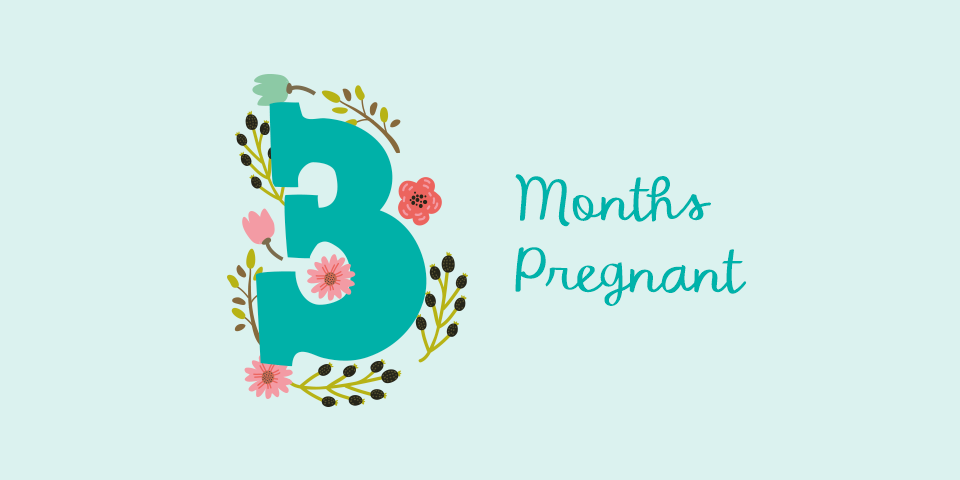 This may leave you feeling exceptionally tired. Be sure to get plenty of rest. Most people get some energy back in the second trimester.
This may leave you feeling exceptionally tired. Be sure to get plenty of rest. Most people get some energy back in the second trimester. - Needing to pee: Your uterus begins to grow to support the pregnancy. It may begin pressing on your bladder, causing you to need to pee more often.
- Acne or other skin changes: Hormones cause your skin to create more oil during pregnancy. This can lead to clogged pores and acne in some people. There are other skin conditions that appear during pregnancy, but most appear in the second or third trimesters.
- Mild shortness of breath: You may feel short of breath with light physical activity.
Your heart is pumping more blood during pregnancy. This means your pulse may be quicker and you may find yourself losing energy more easily. Be mindful of how much demand pregnancy puts on your body and take rests when you feel tired or out of breath.
What tests will I have in the first trimester of pregnancy?
Checkups, screenings and other tests during pregnancy help keep you and the fetus healthy.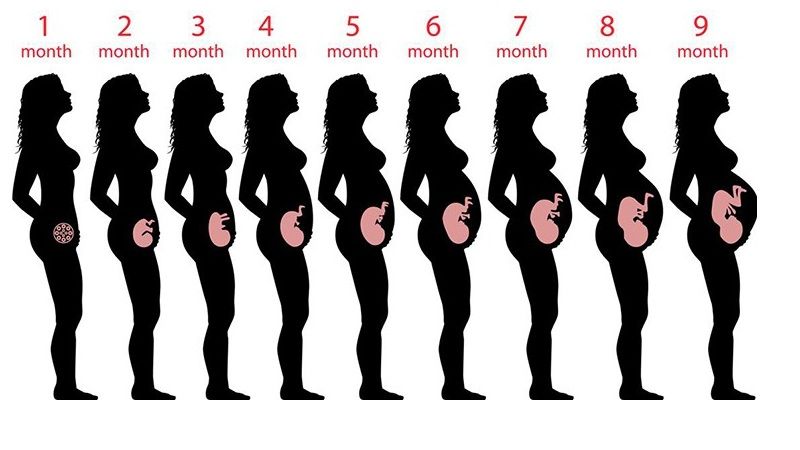 Care during pregnancy is commonly referred to as prenatal care. Prenatal care appointments are important because your pregnancy care provider discusses what you can expect during pregnancy and delivery, performs checkups and screenings and answers any questions you have.
Care during pregnancy is commonly referred to as prenatal care. Prenatal care appointments are important because your pregnancy care provider discusses what you can expect during pregnancy and delivery, performs checkups and screenings and answers any questions you have.
Your first prenatal visit
You’ll have between two and three prenatal visits during your first trimester. This can vary depending on your provider or if you’re a high-risk pregnancy. You can expect to discuss your personal medical history, gynecological and obstetrical history (prior pregnancies and births), as well any family medical history that may affect your pregnancy. This visit is very thorough to make sure you and the growing fetus are healthy.
At your first prenatal visit your provider will calculate your due date. You can also expect them to perform the following:
- A physical exam, including checking your weight and blood pressure.
- A pelvic exam.
- A Pap test (if you’re due for one).
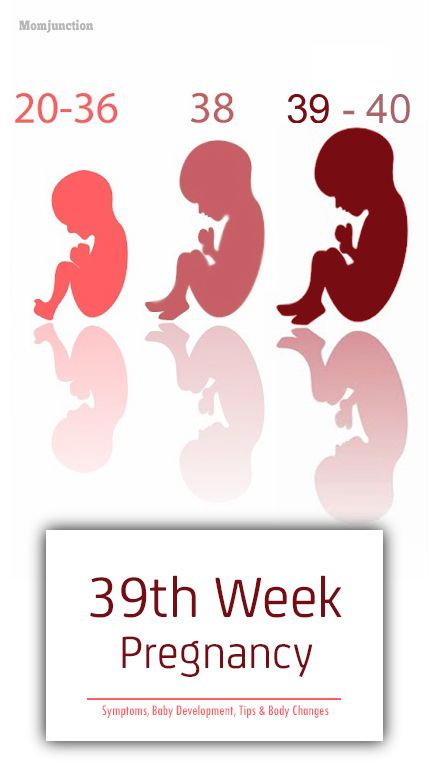
- Tests to check for certain sexually transmitted infections (STIs).
- Check your pee for bacteria, protein and glucose (sugar).
- Order blood tests to check hormone levels, Rh factor, iron levels and certain diseases.
- Check the fetal heart rate.
Some providers use transvaginal ultrasound at your first appointment to confirm pregnancy and measure the fetal heart rate and size. This ultrasound also shows if you’re expecting multiples. A transvaginal ultrasound involves your provider placing a wand inside your vagina. Most pregnant people are offered at least one ultrasound in their first trimester, but the exact timing varies depending on your provider. If you’re expecting multiples, you may be offered additional ultrasounds in your first trimester.
Your provider may suggest other screening tests during pregnancy. Screening tests identify if you or the fetus are at risk for certain health conditions. Based on the results of your screening, you may need diagnostic tests. Diagnostic tests confirm or rule out health problems. In the first trimester, your provider may suggest a screening to detect a higher risk of chromosomal disorders like Down syndrome. Talk to your provider about the screenings they recommend.
Diagnostic tests confirm or rule out health problems. In the first trimester, your provider may suggest a screening to detect a higher risk of chromosomal disorders like Down syndrome. Talk to your provider about the screenings they recommend.
What should I not do in the first trimester of pregnancy?
Once you find out you’re pregnant, it’s normal to have to make some lifestyle changes. These changes help ensure that everyone is healthy. You should avoid the following things during your first trimester of pregnancy:
- Alcohol.
- Cigarettes and tobacco.
- Recreational drugs like opioids.
- Contact sports like football or activities that put pressure on your abdomen.
- Foods like raw fish (sushi), fish high in mercury, uncooked or undercooked meats, lunchmeat and unpasteurized milk, cheese or juice.
- Hot tubs and saunas.
How do I take care of myself in the first trimester of pregnancy?
Staying healthy is important throughout all three trimesters of pregnancy.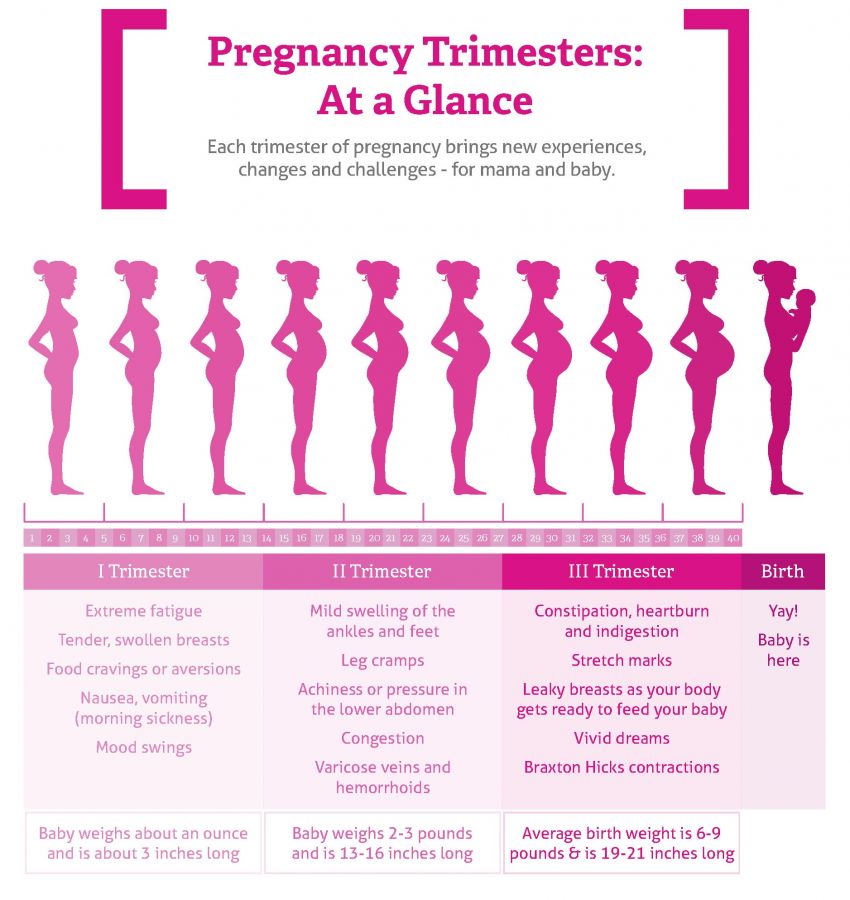 Here are some helpful tips on staying healthy during the first 13 weeks of pregnancy:
Here are some helpful tips on staying healthy during the first 13 weeks of pregnancy:
- Stay active as much as you can. Listen to your body and stop for rest if you feel any discomfort while exercising. You may need to modify your exercise routine during pregnancy.
- Take a prenatal vitamin containing folic acid.
- Eat a variety of healthy foods including fruits, vegetables, meat, eggs and whole grains.
- Get plenty of rest.
- Drink plenty of water.
- Attend all of your prenatal appointments.
Is it normal to bleed during the first trimester of pregnancy?
Light bleeding or spotting during pregnancy is usually OK in the first few weeks of pregnancy. Some people experience implantation bleeding (when a fertilized egg burrows unto your uterine lining). Call your pregnancy care provider if you’re bleeding heavily or the bleeding lasts more than one day.
What prenatal vitamin should I take?
The vitamins and minerals in your food (or in prenatal vitamins) help support the fetus as it grows and develops.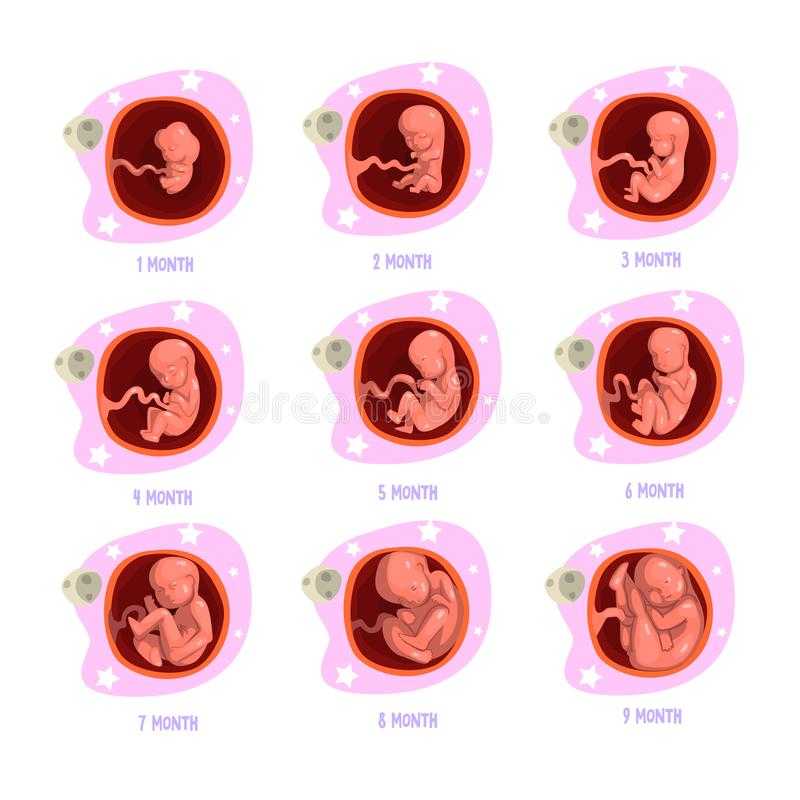 Most providers recommend taking a prenatal vitamin as soon as you begin trying to get pregnant. Vitamins containing folic acid, iron and calcium help support a healthy pregnancy. Talk to your provider if you’re unsure about which prenatal vitamin to take.
Most providers recommend taking a prenatal vitamin as soon as you begin trying to get pregnant. Vitamins containing folic acid, iron and calcium help support a healthy pregnancy. Talk to your provider if you’re unsure about which prenatal vitamin to take.
Can I drink caffeine during pregnancy?
Most healthcare providers recommend limiting caffeine consumption to under 200 milligrams per day during pregnancy. That’s about 12 ounces of coffee or three cans of Mtn Dew®. This is because a fetus can’t metabolize caffeine so it can build up in their body and cause complications.
When should I call my pregnancy care provider during the first trimester?
Call your provider right away if you have:
- A fever higher than 100.4 degrees Fahrenheit.
- Heavy bleeding or unusual vaginal discharge.
- Severe cramping in your belly, arms or legs or abdominal pain.
- Persistent vomiting and/or diarrhea.
- Fainting spells or dizziness.
- Swelling in your hands, fingers or face.

- Blurred vision or spots before your eyes.
A note from Cleveland Clinic
Pregnancy is an exciting, and sometimes scary, time in your life. You may feel overwhelmed with information and have lots of questions. During the first trimester of pregnancy, your body is growing and changing rapidly. The fetus is growing and developing, too. In fact, by the end of the first trimester, the fetus is the size of a lemon. You may begin having symptoms of pregnancy like nausea, sore breasts or needing to pee more often. Schedule an appointment with a pregnancy care provider as soon as you know you’re pregnant. Regular prenatal care is important so you and the fetus stay healthy and strong during pregnancy.
First trimester | Pregnancy Birth and Baby
First trimester | Pregnancy Birth and Baby beginning of content5-minute read
Listen
From the moment you get the news that you are pregnant, you will probably be filled with a rush of emotions – and most likely a flood of questions too.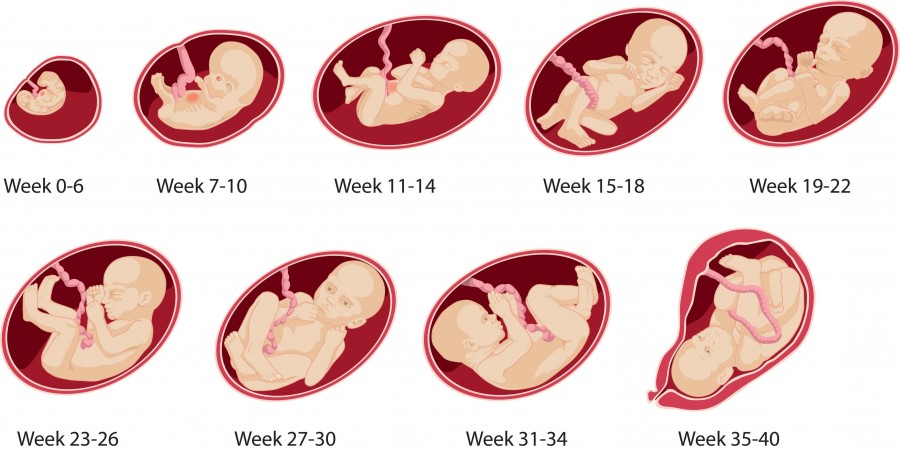 While the first trimester of pregnancy is filled with a host of changes for you and for your baby, many will be invisible to the outside world. Read on to find out what happens to your body and how to stay healthy.
While the first trimester of pregnancy is filled with a host of changes for you and for your baby, many will be invisible to the outside world. Read on to find out what happens to your body and how to stay healthy.
What is the first trimester?
A full-term pregnancy lasts around 9 months, and most people (including your doctors and midwives) will break this up into 3 ‘trimesters’. Although you are pregnant from the moment of conception – when a male sperm fertilises your ovum (egg) – the first trimester of pregnancy is counted from the first day of your last period through to week 12. This is because most women who conceive naturally won’t know the date of conception.
Trimesters are a helpful way to think about pregnancy because the changes that happen to you and your baby fall into the 3 broad categories of early, middle and late pregnancy, called first, second and third trimesters.
What happens to your body?
For some women, the first trimester is characterised by nausea (often called ‘morning sickness’, although it can occur at any time of day).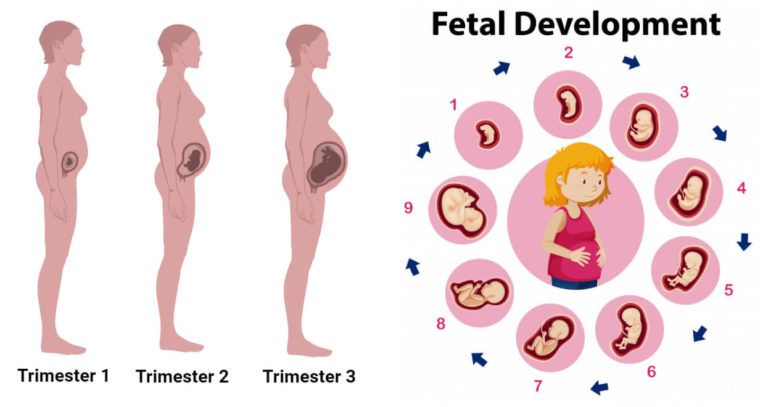 But remember that every pregnancy is different and while some women have food cravings, others experience food aversions, and some have no change in appetite at all.
But remember that every pregnancy is different and while some women have food cravings, others experience food aversions, and some have no change in appetite at all.
Other changes in the first trimester include changes to your breasts as they become tender, larger and heavier, while your uterus will grow and put pressure on your bladder so that you need to urinate more often.
Your emotions
You might feel a range of emotions during your first trimester. Hormone changes may make you feel moody or irritable, and tiredness is common in the early months. These feelings are normal, so discuss how you feel with you partner or with a close friend. If you feel down or anxious, speak with your doctor or midwife.
What happens to the baby?
Through the first trimester, your baby goes from being a fertilised ovum to a fetus of about 6cm in length at 12 weeks. By the end of the first trimester, your baby’s heart is starting to beat, and the brain, stomach and intestines are developing. There are little bumps known as 'buds' where arms and legs are starting to grow.
There are little bumps known as 'buds' where arms and legs are starting to grow.
What can be expected from the doctor and midwife?
Your antenatal (pregnancy) health checks might be with your GP, a midwife or an obstetrician, depending on where you will give birth. During your first antenatal health check, you will probably have your pregnancy confirmed with a urine or blood test. These are more reliable than home pregnancy tests. First trimester antenatal health checks usually happen every 4 to 6 weeks, but this can vary, based on your health and how your baby develops.
Many women are offered an ultrasound scan at around 12 weeks – you might hear the baby’s heartbeat at this scan. This ultrasound will also show if you are having a multiple birth (e.g. twins) and can help estimate the baby’s size and due date, as well as check for some health conditions.
Other health checks during the first trimester include:
- urine tests to detect urinary infections, a common but manageable condition that if left untreated can trigger pre-term labour
- blood tests to check your blood type (particularly Rh status), iron levels, blood sugars (for gestational diabetes), rubella (German measles) immunity, and other infections such as HIV, hepatitis B and syphilis
- general maternal health and wellbeing checks, including a discussion of concerns you might have about your pregnancy or general health, and a medication review (including natural or alternative medicines) to check for safety during pregnancy
How to stay healthy
Staying healthy is doubly important during pregnancy. If you are a smoker, this is a great time to quit – speak with your doctor or pharmacist for support.
If you are a smoker, this is a great time to quit – speak with your doctor or pharmacist for support.
It is safest not to drink any alcohol while you are pregnant, since even low-level drinking, particularly in the first trimester of pregnancy, can have long-term negative effects on your baby.
Try to eat a variety of nutritious foods during pregnancy since this will help meet your baby’s nutritional requirements, as well as your own. While the amount of food you need to eat during your first trimester won’t increase by much, you will need more of some nutrients. Most women will also need folic acid and iodine supplements because it's difficult to get enough of these from food alone.
It’s important to keep up regular physical activity during your pregnancy because of the many benefits both for you and your baby. If you experience any discomfort or complications, speak to your doctor or midwife.
Things to consider in the first trimester
- Book your antenatal appointments for the whole trimester – they are important for tracking your health and your baby’s growth.
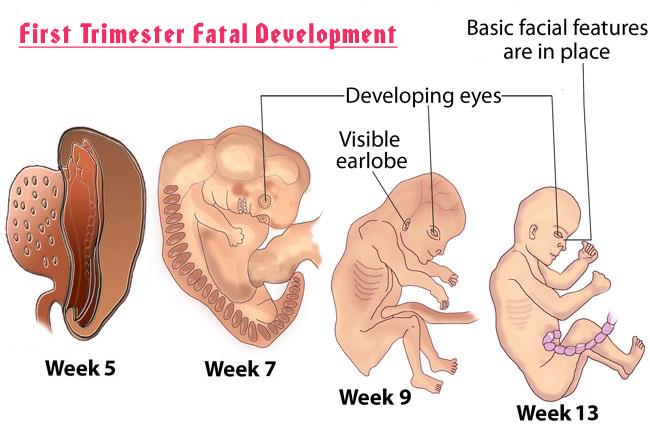
- Get support – ask your partner, a friend or a family member to go with you to health checks.
- Are your vaccinations up to date? Immunisation is important, and several vaccines are funded for pregnant women under the National Immunisation Program. Speak to your doctor for guidance.
- Your doctor or midwife can help you access a range of support services, not just for medical concerns - for example, if you feel you are at risk of violence or you are feeling vulnerable during your pregnancy.
Your pregnancy journey
Follow your pregnancy week-by-week to find out how your baby is growing and what is happening to your body.
Sources:
NSW Health (Having a baby), Royal Women's Hospital (Pregnancy and birth), Raising Children Network (Pregnancy week-by-week), Women's and Children's Health Network (The first 3 months of pregnancy: the first trimester), Better Health Channel (Pregnancy - prenatal tests)Learn more here about the development and quality assurance of healthdirect content.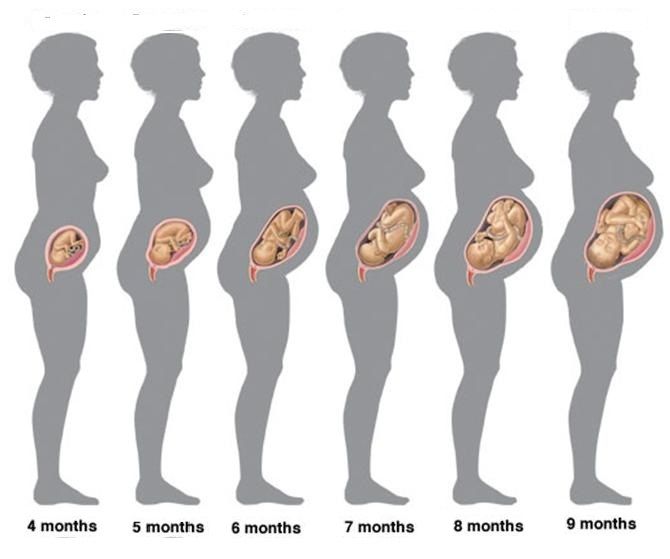
Last reviewed: May 2021
Back To Top
Related pages
- Pregnancy week-by-week
- Third trimester
- Second trimester
Need more information?
Pregnancy at week 7
Your baby is now about 1cm long and if you haven’t seen your doctor yet, now is a good time to start your antenatal care.
Read more on Pregnancy, Birth & Baby website
Non-invasive prenatal testing (NIPT)
A non-invasive prenatal test (NIPT) is a sensitive test to screen for Down syndrome and some other chromosomal disorders early in pregnancy.
Read more on Pregnancy, Birth & Baby website
Antenatal care during your pregnancy
You receive antenatal care from your GP, midwife or obstetrician. You’ll be offered tests and scans and your health and your baby’s will be checked.
You’ll be offered tests and scans and your health and your baby’s will be checked.
Read more on Pregnancy, Birth & Baby website
Men’s feelings in early pregnancy | Raising Children Network
In early pregnancy, it’s normal for men to feel uninterested or just ‘not into it’. Read more about men’s feelings during pregnancy in our Dads Guide.
Read more on raisingchildren.net.au website
Week by week pregnancy- antenatal care at 7 weeks pregnant
Your doctor can look at your foetus’s features to determine how old they are – find out how. You need to talk to your doctor if you experience very severe morning sickness as you may not be getting all the nutrients you and your baby need or early pregnancy spotting (spot bleeding) as you may be at risk of miscarriage.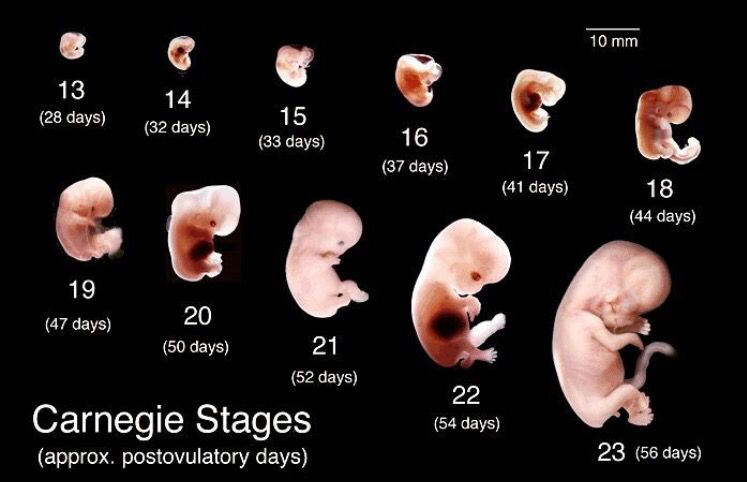
Read more on Parenthub website
Routine antenatal tests
During pregnancy, you'll be offered a range of tests, including blood tests and ultrasound scans. Each test can tell you something about you and your baby’s health.
Read more on Pregnancy, Birth & Baby website
Pregnancy care for migrant and refugee women | Australian Government Department of Health and Aged Care
While many migrant and refugee women experience healthy pregnancies, issues associated with resettlement can contribute to poorer perinatal outcomes than those experienced by women in general.
Read more on Department of Health and Aged Care website
Second trimester
During the second trimester, your baby’s organs will develop and they will start to hear sounds. Any morning sickness will likely ease off around this time.
Any morning sickness will likely ease off around this time.
Read more on Pregnancy, Birth & Baby website
Third trimester
The third trimester is the last 3 months of your pregnancy – an exciting time, but with some discomforts too. Learn more about what to expect before the birth.
Read more on Pregnancy, Birth & Baby website
The challenges and benefits of antenatal tests for aboriginal mothers | Know Pathology Know Healthcare
For many pregnant Aboriginal and Torres Strait Islander women poor health and social disadvantage contribute to poorer perinatal outcomes than those of non-Indigenous women.
Read more on Know Pathology Know Healthcare website
Disclaimer
Pregnancy, Birth and Baby is not responsible for the content and advertising on the external website you are now entering.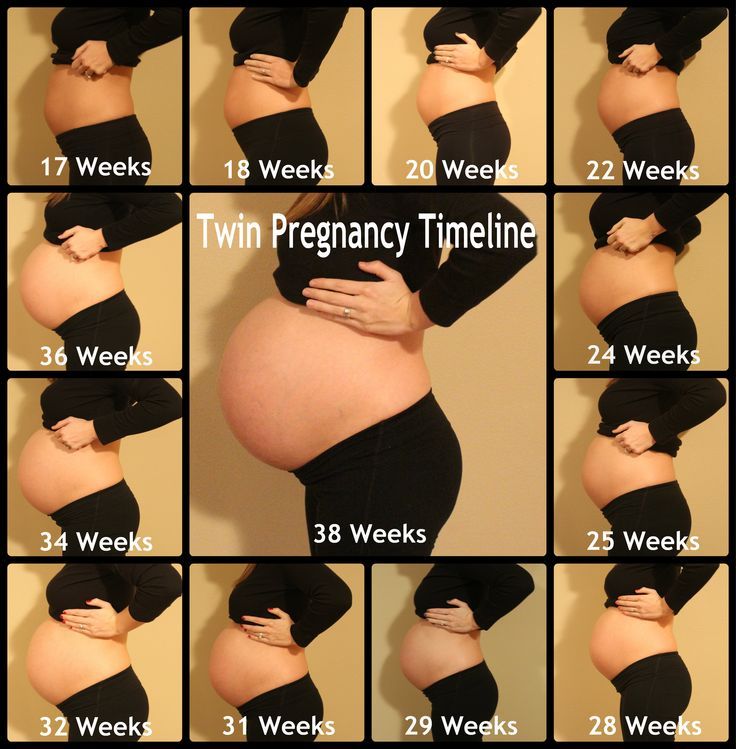
Need further advice or guidance from our maternal child health nurses?
1800 882 436
Video call
- Contact us
- About us
- A-Z topics
- Symptom Checker
- Service Finder
- Linking to us
- Information partners
- Terms of use
- Privacy
Pregnancy, Birth and Baby is funded by the Australian Government and operated by Healthdirect Australia.
Pregnancy, Birth and Baby is provided on behalf of the Department of Health
Pregnancy, Birth and Baby’s information and advice are developed and managed within a rigorous clinical governance framework. This website is certified by the Health On The Net (HON) foundation, the standard for trustworthy health information.
This site is protected by reCAPTCHA and the Google Privacy Policy and Terms of Service apply.
This information is for your general information and use only and is not intended to be used as medical advice and should not be used to diagnose, treat, cure or prevent any medical condition, nor should it be used for therapeutic purposes.
The information is not a substitute for independent professional advice and should not be used as an alternative to professional health care. If you have a particular medical problem, please consult a healthcare professional.
Except as permitted under the Copyright Act 1968, this publication or any part of it may not be reproduced, altered, adapted, stored and/or distributed in any form or by any means without the prior written permission of Healthdirect Australia.
Support this browser is being discontinued for Pregnancy, Birth and Baby
Support for this browser is being discontinued for this site
- Internet Explorer 11 and lower
We currently support Microsoft Edge, Chrome, Firefox and Safari.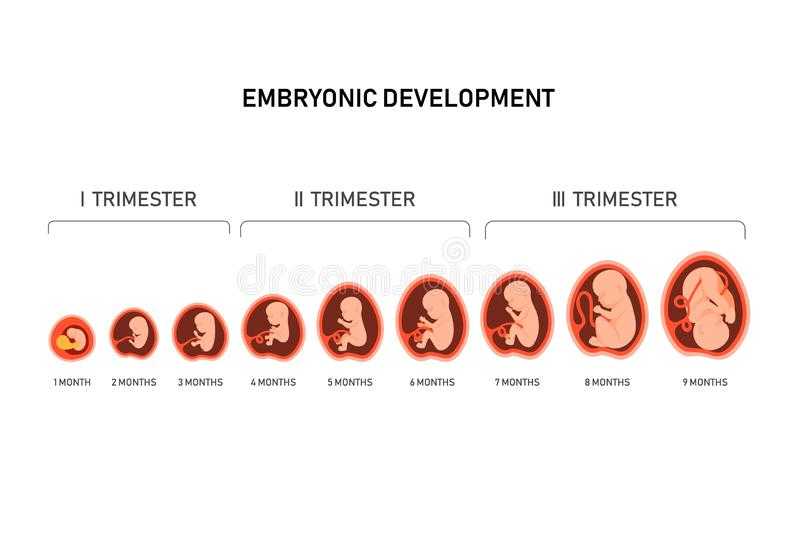 For more information, please visit the links below:
For more information, please visit the links below:
- Chrome by Google
- Firefox by Mozilla
- Microsoft Edge
- Safari by Apple
You are welcome to continue browsing this site with this browser. Some features, tools or interaction may not work correctly.
Pregnancy calendar
You are pregnant! Your baby will be born in 40 weeks. What changes will occur in your body, how your baby will grow will tell "Calendar of pregnancy".
1-2 weeks
Pregnancy begins at the moment of fertilization or conception.
Fertilization is a complex biological process of the fusion of female and male germ cells (egg and sperm). The resulting cell (zygote) is a new daughter organism.
A mature egg leaves the ovary approximately on the 12-14th day of the menstrual cycle (ovulation) and enters the fallopian tube, where it remains viable for 24 hours.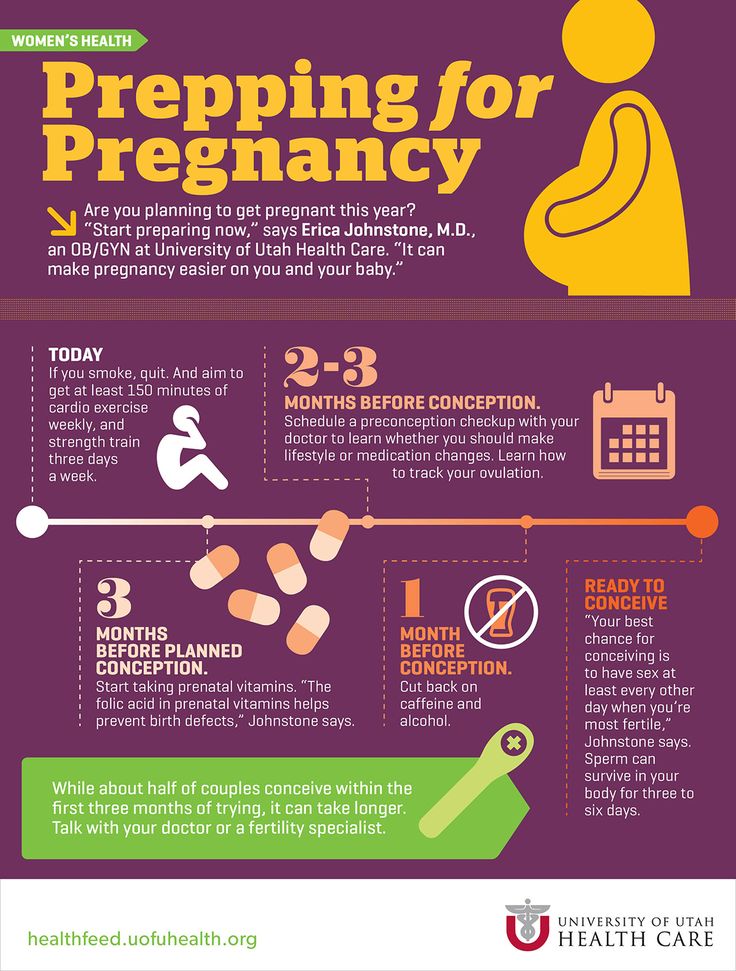 During an orgasm, a man ejects from 200 to 400 million spermatozoa into the woman's vagina. Some of them penetrate through the cervix into the uterine cavity, and from there into the fallopian tubes. Here, spermatozoa retain the ability to fertilize for 48 hours. Thus, within 6-7 days of a woman's menstrual cycle, conception is possible.
During an orgasm, a man ejects from 200 to 400 million spermatozoa into the woman's vagina. Some of them penetrate through the cervix into the uterine cavity, and from there into the fallopian tubes. Here, spermatozoa retain the ability to fertilize for 48 hours. Thus, within 6-7 days of a woman's menstrual cycle, conception is possible.
Fertilization of the female egg is performed by a single sperm in the upper part of the fallopian tube. There are two types of sperm: those containing the Y chromosome (“male”) and the X chromosome (“female”). When an egg cell (containing the X chromosome) fuses with a sperm cell, their genetic material is combined and the sex of the child is determined. If there are two X chromosomes in the child's genetic makeup, it's a girl; if an X chromosome and a Y chromosome, it's a boy. It is impossible to change the sex of the child, so you should not follow the "folk beliefs" that guarantee the birth of a child of a given gender.
The fertilized egg begins to divide with the formation of a multicellular organism and move through the fallopian tube into the uterine cavity.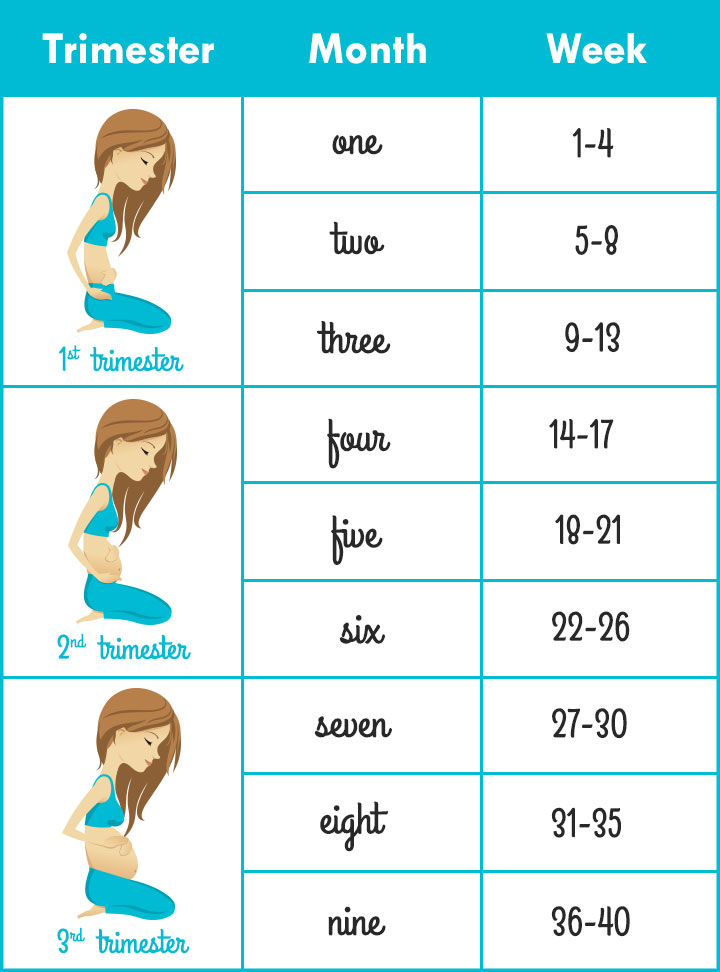 During this period, the nutrition of the embryo is carried out at the expense of those substances that have been accumulated in the egg. If the peristalsis of the tube is slowed down (due to inflammatory diseases), the embryo penetrates the wall of the fallopian tube with the occurrence of an ectopic pregnancy.
During this period, the nutrition of the embryo is carried out at the expense of those substances that have been accumulated in the egg. If the peristalsis of the tube is slowed down (due to inflammatory diseases), the embryo penetrates the wall of the fallopian tube with the occurrence of an ectopic pregnancy.
Implantation (introduction) of the embryo into the uterine wall occurs 7-8 days after fertilization.
On the seventh day of pregnancy, the outer layer of the embryo (trophoblast) begins to produce a hormone - chorionic gonadotropin. This hormone gives the mother's body information that pregnancy has occurred, and begins its functional restructuring. Diagnostic test strips detect the chorionic gonadotropin in the urine of a pregnant woman, which makes it possible to diagnose pregnancy at an early stage.
3-4 weeks
You do not have the expected menstruation, nausea in the morning, and frequent urination during the day. You become emotionally labile, irritable, whiny.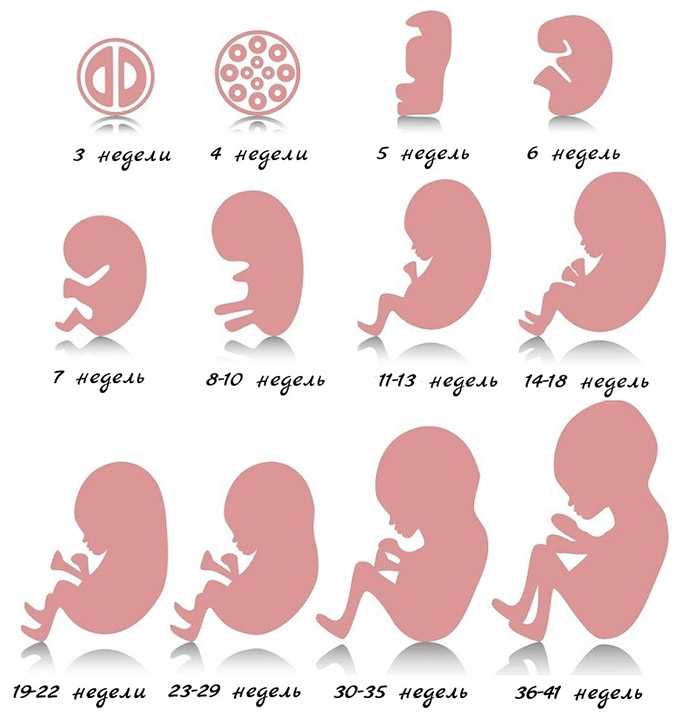 Basal body temperature is above 37°C.
Basal body temperature is above 37°C.
In appearance, your unborn baby resembles a small auricle measuring 4 mm, surrounded by a small amount of amniotic fluid. On the 21st day after conception, the brain and spinal cord are formed. By the end of the first month, the circulation of embryonic blood is established, the umbilical cord has formed - the connection of the embryo with the future placenta. The eye sockets, the rudiments of arms and legs appeared, the laying and development of other internal organs of the fetus is underway: the liver, kidneys, urinary tract, and digestive organs.
5-6 weeks
You no longer doubt that you are pregnant. Regardless of how you feel, all pregnant women need to visit a antenatal clinic and undergo an examination that will allow you to identify and correct existing health problems in time.
Starting from the 5th week, there may be a threat of termination of pregnancy. This will be evidenced by: periodic pain in the lower abdomen and in the lumbar region, a feeling of pressure on the rectum, an increased amount of mucus.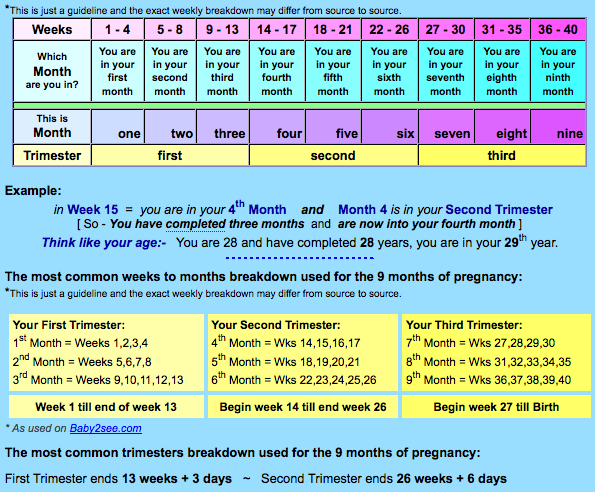 If you experience these symptoms, you should consult a doctor.
If you experience these symptoms, you should consult a doctor.
By week 6, the face is formed in the embryo: eyes, nose, jaws and limbs.
7-8 weeks
From the 7th week of pregnancy, the yellow body of pregnancy undergoes reverse development, the production of hormones begins to be carried out by the forming placenta.
The baby develops large blood vessels, the heart becomes four-chambered. Bile ducts appear in the liver. There is a development of the endocrine glands, the brain. The auricles are already formed, fingers have appeared on the limbs. The embryo begins to move. At week 8, under the influence of the Y chromosome, the formation of male gonads (testicles) occurs. They begin to produce testosterone - the male sex hormone, which will lead to the formation of the sexual characteristics of the boy.
9-10 weeks
Your metabolism is changing significantly to provide the growing body with all the necessary "building materials" - amino acids, energy. Disadaptation to such a restructuring can result in toxicosis of the 1st half of pregnancy. It is characterized by nausea, vomiting, salivation, weight loss. When the first symptoms appear, consult a doctor.
Disadaptation to such a restructuring can result in toxicosis of the 1st half of pregnancy. It is characterized by nausea, vomiting, salivation, weight loss. When the first symptoms appear, consult a doctor.
At the tenth week, the development of the oral cavity, intestines, rectum, and bile ducts ends in the embryo. The formation of the face and hemispheres of the brain was completed. The development of the cerebellum, the main coordinator of movements, begins.
11-12 weeks
The body has adapted to the new conditions. By this time, nausea, vomiting, salivation practically disappear. You become balanced, calm.
After 12 weeks, the growth of the uterus becomes noticeable
13-14 weeks
By this time, the formation of the main organs of the unborn child is completed. In appearance, the fetus resembles a small person.
15-16 weeks
A change in skin pigmentation is possible - the midline of the abdomen, nipples and the skin around them have darkened.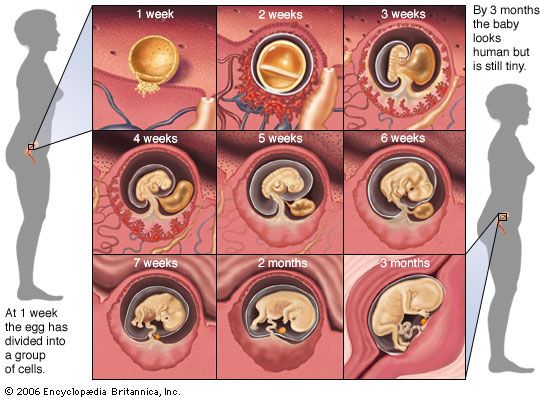 These phenomena should pass soon after childbirth.
These phenomena should pass soon after childbirth.
The formation of the placenta ends. The fetus and placenta represent a single functional system. During this period of pregnancy, the fetus floats freely in the amniotic fluid. The composition of the amniotic fluid can determine the condition of the fetus.
17-18 weeks
These days, your unborn child begins to move. His limbs, ligamentous apparatus, cerebellum have already developed enough. By this time, the formation of the immune system is completed.
19-20 weeks
There have been big changes in your body. The pulse quickened, cardiac output increased significantly (40% higher than the initial level) and the volume of circulating blood (almost 500 ml).
Due to the increased volume of plasma compared to the mass of red blood cells, hemoglobin decreases in blood tests.
Some women during this period experience frequent and painful urination, pain in the lumbar region on the right or left, weakness.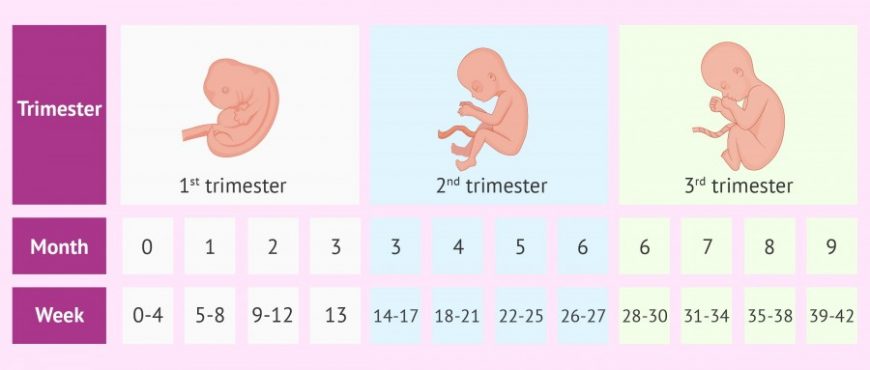 A large uterus presses down on the bladder, the mouth of the ureters, disrupting the outflow of urine. Stagnation of urine and incomplete emptying of the renal pelvis create conditions for the development of infection. Bacteriuria develops and pyelonephritis of pregnant women may occur. If there is any suspicion of pyelonephritis, you should immediately consult a doctor, because this disease is not only dangerous for your health, but also for the further growth and development of the fetus.
A large uterus presses down on the bladder, the mouth of the ureters, disrupting the outflow of urine. Stagnation of urine and incomplete emptying of the renal pelvis create conditions for the development of infection. Bacteriuria develops and pyelonephritis of pregnant women may occur. If there is any suspicion of pyelonephritis, you should immediately consult a doctor, because this disease is not only dangerous for your health, but also for the further growth and development of the fetus.
The weight of the baby is 300-350 grams, he often and quite actively moves, swallows amniotic fluid, begins to open his eyes.
21-22 weeks
In these weeks, the fetus already has a mass of 400-500 grams, and it develops very intensively bones and muscles, which require calcium from your body. Therefore, if you do not want to lose your white-toothed smile, then, on the advice of your obstetrician-gynecologist, start taking calcium supplements regularly. This will help save your teeth and get rid of leg cramps.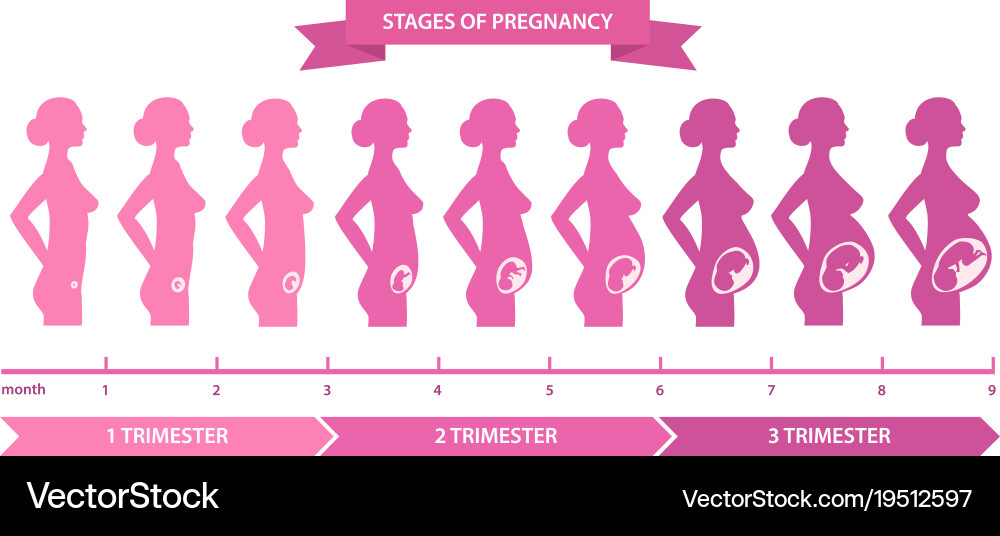 They appear for the same reason of calcium deficiency.
They appear for the same reason of calcium deficiency.
23-24 weeks
At this time, the weight of the fetus is 500-600 g. It already has all the organs and systems fully formed. Until that time, only his lungs remained immature. And now, by 24 weeks, they begin to ripen. And the cells lining the lung alveoli produce surfactant, a substance that, by lubricating the alveoli, prevents them from sticking together during breathing. However, the amount of surfactant is so small that a child born at this time will not be able to breathe on its own. To survive outside the uterus, he needs sophisticated breathing equipment, incubators, a control system, infusors for nutrition, infusion media, artificial surfactant.
There are perinatal centers where children born during these terms of pregnancy are nursed. It is very difficult. And therefore, the longer the pregnancy is prolonged, the more likely the birth of a healthy and viable child. Therefore, try to do everything so that the child is born on time, full-term and healthy.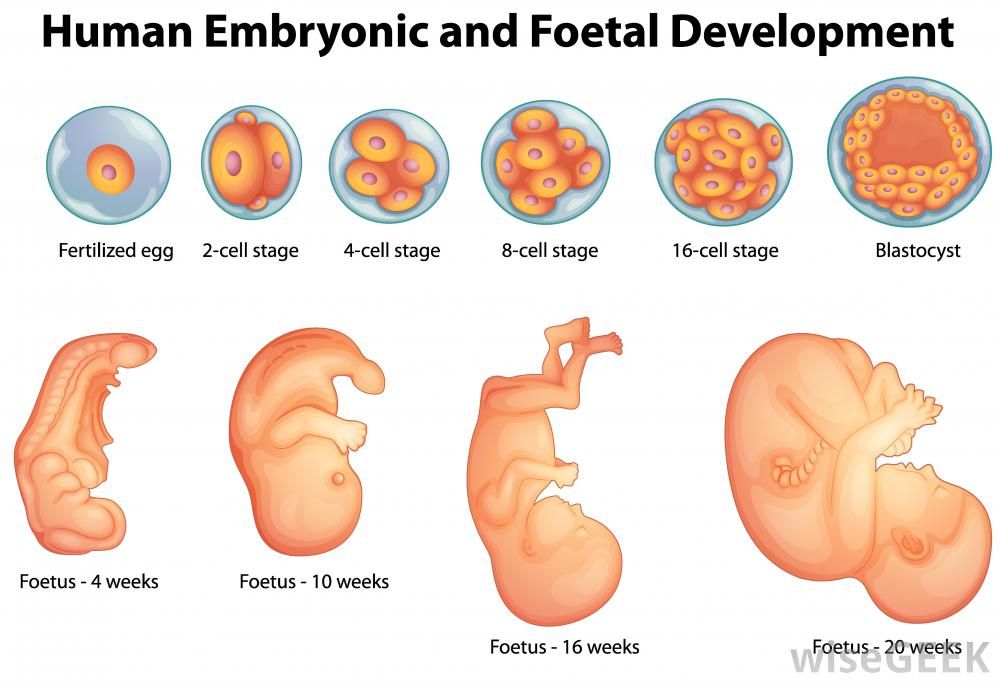
By this gestational age, the uterus is at a height of about 24 cm above the pubic bone, and now it not only builds up muscles, but is also stretched by the fetus that completely filled its cavity.
25-26 weeks
The fetus already has a mass of 700-750 g. Due to the improvement of the brain structures in his body, a connection is established with the adrenal cortex and they begin to produce corticoids - hormones necessary for adaptation. The pituitary gland of the fetus reaches such a degree of maturity that the production of adrenocorticotropic hormone begins, which also stimulates hormonal production by the adrenal glands. In short, all forces are thrown to the upcoming "publication". But the most obvious changes in these weeks occur in the lungs - there is an increased maturation of cells that produce surfactant. However, a fetus born during this period can only survive in incubators with artificial lung ventilation, artificial feeding with special infusion media.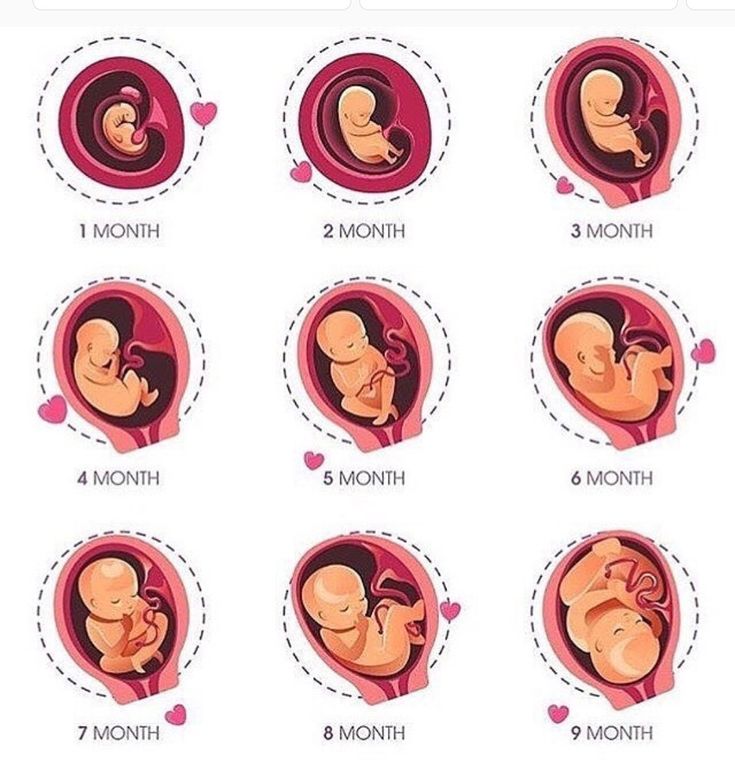 Therefore, try to keep both him and yourself from rash steps.
Therefore, try to keep both him and yourself from rash steps.
At this time, it's time to start preparing for the future feeding of the child. Under the influence of placental lactogen, your breasts, that is, the mammary glands, are growing rapidly. From time to time, droplets of colostrum may appear on the nipples. Daily air baths, washing with cool water, rubbing the nipples with a rough towel will help prepare the nipples for feeding. If the nipples are flat, start to stretch them little by little.
27-28 weeks
This period completes the second trimester of pregnancy. By this time, the fetus weighs up to 1000 g and has a height of up to 35 cm. However, he still cannot live on his own, because. his lungs are not mature enough and special equipment is still needed to nurse him. During these periods of pregnancy, there is an intensive growth of the fetus, the formation of muscles. His movements become more active. Periods of movement alternate with its relatively calm state when the fetus is sleeping.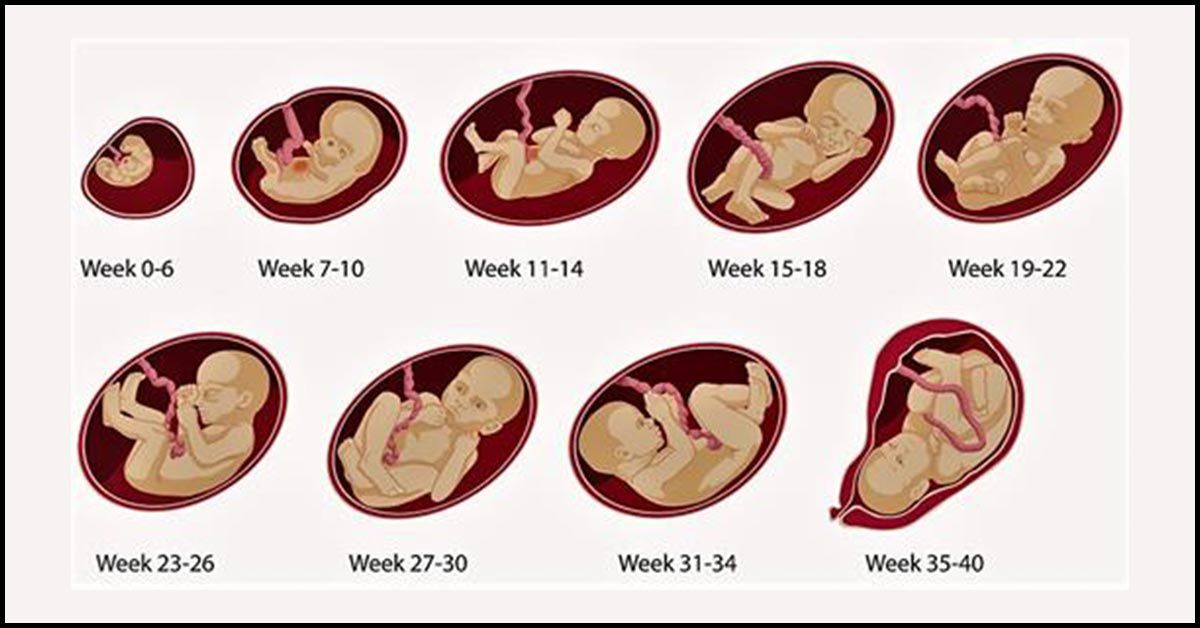 With an ultrasound, you can see that he already knows how to suck his thumb and even smile!
With an ultrasound, you can see that he already knows how to suck his thumb and even smile!
The fundus of the uterus stands on average at a height of 27-28 cm above the womb.
29-30 weeks
The third trimester of pregnancy begins. The uterus stands at a height of 29-30 cm, it becomes more difficult for you to breathe. Now one of the most serious complications can develop - toxicosis of the second half of pregnancy, which is characterized by the appearance of edema, increased blood pressure and the appearance of protein in the urine. For early diagnosis of this complication, it is necessary to carefully observe an obstetrician-gynecologist and follow all his recommendations, incl. strict weight control. In the III trimester of pregnancy, the daily weight gain should be no more than 50 g, i.e. no more than 300 g per week. You should also monitor the ratio of drunk and secreted fluid.
31-32 weeks
Have you asked your doctor how the fetus is? Find out now it's very important. Its position can be longitudinal, transverse, oblique. Correct, normal is the longitudinal position of the fetus. Childbirth is safer with cephalic presentation. From this period of pregnancy, it is necessary to wear a prenatal bandage that will support the anterior abdominal wall and help maintain the correct position and presentation of the fetus. If the presentation of the fetus is breech, i.e. above the entrance to the pelvis is the pelvic end of the fetus, then the bandage should not be worn yet. There is gymnastics to correct the presentation of the fetus.
Its position can be longitudinal, transverse, oblique. Correct, normal is the longitudinal position of the fetus. Childbirth is safer with cephalic presentation. From this period of pregnancy, it is necessary to wear a prenatal bandage that will support the anterior abdominal wall and help maintain the correct position and presentation of the fetus. If the presentation of the fetus is breech, i.e. above the entrance to the pelvis is the pelvic end of the fetus, then the bandage should not be worn yet. There is gymnastics to correct the presentation of the fetus.
In the morning and evening for 1 hour, do the following: lie down on the bed on your left side and lie quietly for 15 minutes, then turn over to your right side and lie for the next 15 minutes, and then repeat these turns 2 more times.
Pregnant women with Rh-negative blood and with O (I) blood type need blood tests for Rh - or group immune antibodies. Immunization of pregnant women with Rh-negative blood is carried out from 28 weeks and within 72 hours after childbirth according to the indications, which will be discussed by the doctor observing you in the antenatal clinic.
33-34 weeks
The fetus already has a mass of 1800-2100 g, a height of 40-41 cm. By the end of this period, its lungs will begin to produce surfactant in full and will be able to breathe without special equipment. The fetus is fully developed, its chances of surviving in case of preterm birth are greatly increased. However, there is still extremely little subcutaneous fat, so his skin is thin and has a red color. Such a newborn retains heat very poorly and at birth needs an incubator or a heating pad. His body is still covered with fluff and cheese-like grease, the auricles are still very small, but they are already beginning to straighten out, the boy's testicles descend into the scrotum.
Caring for a premature baby is the hardest work for the whole family, associated with high material costs, physical overload of parents, and this work is not always rewarded, since a child can be born and remain sick. Therefore, up to 37 weeks of pregnancy, a woman should be especially attentive to her condition and, at the slightest suspicion of an increase in the tone of the uterus, starting frequent and regular contractions, immediately consult a doctor.
Doctors know that women, in anticipation of the arrival of a new person in the house, begin to glue walls and paint ceilings during this period. Don't take unnecessary risks. For this, prenatal leave is provided from 30 weeks, so that you can avoid overwork, do not push in transport, and have the opportunity to sleep. So repairs, stuffy shops, queues are no longer for you.
35-36 weeks
The fetus already has a mass of 2100-2700 g and a height of 44-45 cm. It is advisable to see a doctor during this period of pregnancy at least once every 10 days.
37-38 weeks
From this point on, your pregnancy is considered full-term. And if you have a baby in these weeks, he will live. Its development is complete. Now he has a mass of approximately 2700-3000 g. Height is 49-50 cm. The remaining two weeks he will add a little in weight and height.
It becomes easier for you to breathe, as the fetal head is pressed tightly against the entrance to the pelvis, the uterus pulls the anterior abdominal wall more, and therefore its bottom sank lower. Tension of the uterus; small sharp pulling pains in the lumbar region.
Tension of the uterus; small sharp pulling pains in the lumbar region.
With an exacerbation of extragenital diseases, the appearance of signs of toxicosis in the second half of pregnancy, with an incorrect position of the fetus, with some gynecological diseases, against which pregnancy develops, a scar on the uterus, etc., early prenatal hospitalization is required. Do not forget to take an exchange card, passport, medical insurance policy and birth certificate to the hospital.
39-40 weeks
You can find out the approximate day of delivery by the date of the last normal menstruation - count back three months and add 7 days. The resulting number will be the estimated date of birth. More precisely, according to many parameters, ultrasound data, additional studies, the date of the first fetal movement, the date of the first visit to the obstetrician-gynecologist, especially if the visit was before 11-12 weeks of pregnancy.
The child already has all the signs of maturity.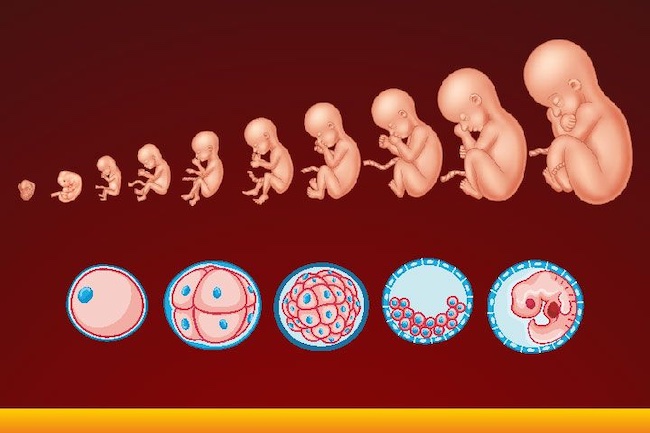 His weight is more than 3000 g, and his height is more than 50 cm, he has fair skin, a sufficient amount of subcutaneous fat, he retains heat and does not need special heating. He will scream loudly, breathe, suck. There is a very small amount of lubricant on the skin, which will no longer be able to protect it from the effects of amniotic fluid.
His weight is more than 3000 g, and his height is more than 50 cm, he has fair skin, a sufficient amount of subcutaneous fat, he retains heat and does not need special heating. He will scream loudly, breathe, suck. There is a very small amount of lubricant on the skin, which will no longer be able to protect it from the effects of amniotic fluid.
For you, regular contractions (1 contraction every 10 minutes) will become an indicator of the beginning of the birth process, or you will feel the outflow of amniotic fluid, you will see scanty bloody discharge - do not panic, call an ambulance, the telephone number for transportation for pregnant women is written on the margins of your exchange card. While she is driving, change your clothes, prepare your passport, exchange card, medical insurance policy and birth certificate.
Early pregnancy | Shchelkovsky perinatal center
Pregnancy is a wonderful period! However, the changes taking place in the body at this time can greatly frighten you.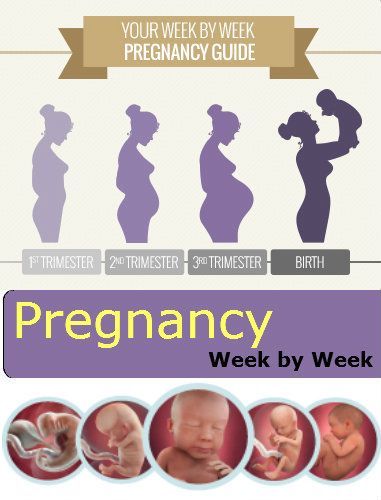 The phenomena characteristic of pregnancy are different for all women, and will not necessarily be repeated during each subsequent gestation. Let's analyze the most common symptoms, their causes and possible methods of correction.
The phenomena characteristic of pregnancy are different for all women, and will not necessarily be repeated during each subsequent gestation. Let's analyze the most common symptoms, their causes and possible methods of correction.
1. Frequent urination.
Frequent, painless (!) urge to urinate is one of the signs of pregnancy. This is due to increased secretion of progesterone (pregnancy hormone), changes in metabolism and pressure from the growing uterus on the bladder.
Be sure to see a doctor if:
- urination is painful (this may be a sign of an infection)
- urine of strange color (stained with blood, brown)
- the amount of urine excreted per day is much less than the liquid drunk per day
Life hack! In no case should you limit your fluid intake! To alleviate the condition and reduce the frequent urge to urinate, it is necessary to exclude products that have a diuretic effect: tea, coffee, zucchini, watermelon; as well as salty, spicy and fried foods. It is better to drink water or juice. Wear comfortable cotton underwear that does not squeeze the lower abdomen.
It is better to drink water or juice. Wear comfortable cotton underwear that does not squeeze the lower abdomen.
2. Nausea, vomiting, heartburn, increased susceptibility to smells.
Nausea is one of the common symptoms of early pregnancy. The range of issues related to nausea and vomiting during pregnancy is quite wide. From "it's good, I don't even feel sick" (with relief), "I don't feel sick, what's wrong with me?" (with anxiety) to "when will this nausea pass" (with hope). Indeed, these symptoms are not at all a mandatory accompaniment of gestation, they can manifest at 7-8 weeks and last up to 12-14 weeks. The duration of this condition can sometimes be delayed, but rarely persists throughout pregnancy.
Life hack! For nausea, eat before feeling hungry. Solid, non-hot food and drinks at a cool temperature are best. With heartburn, you should eat small portions of food and often, and most importantly, sit, stand or walk for at least 30 minutes after eating, but do not lie down.
You should definitely consult a doctor if:
- vomiting occurs even after drinking water
- vomiting is exhausting, accompanied by dizziness, weakness
- dryness, jaundice and flaking of the skin appear
- nausea and vomiting interfere with proper nutrition, accompanied by weight loss
To reduce nausea and vomiting in the morning, try eating something before you get out of bed. It can be a cracker, a cookie, a piece of hard cheese. And salty food is preferable to sweet. You can have a snack in the same way at night when you get up to go to the toilet. Do not lie down immediately after eating, this will only increase nausea. Vitamins for pregnant women with nausea should be taken in the evening after meals. Cool water with lemon, ginger, mint tea, or ginger or mint candies can alleviate the condition. It is necessary to exclude those foods, drinks and smells that are unpleasant to you. Brushing your teeth and rinsing your mouth often can also reduce nausea.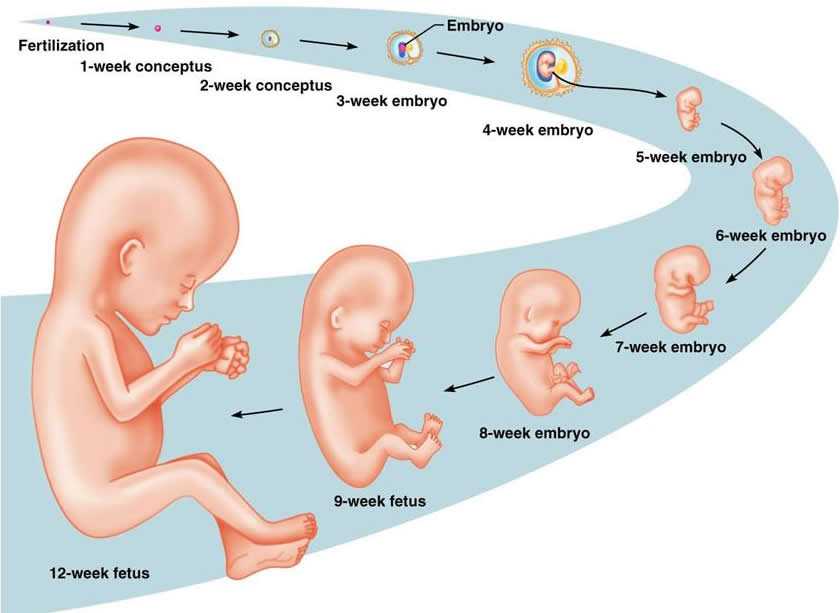
3. Pain or cramps in the lower abdomen, constipation, pain in the lumbar region.
The simplest and most easily controlled cause of pain is delayed and incomplete bowel movements. An increase in the concentration of progesterone relaxes the smooth muscles, which are located not only in the uterus, but also in other hollow organs. In this case, the correction of the diet and the restoration of the passage of feces will help. If the measures are ineffective, the doctor may prescribe safe drugs for you. A special type of pain that occurs during exclusivity in pregnant women is pain in the round ligament of the uterus. This acute, rather intense pain occurs, as a rule, on the one hand with a sharp change in body position (for example, when getting up from a chair or leaving a car). This pain occurs due to stretching, and then a sharp contraction, like a spring, of the round uterine ligaments. The pain quickly passes if you immediately take a comfortable position and does not require special treatment.
You should definitely consult a doctor if:
- pain is accompanied by spotting bloody discharge from the external genitalia
- increasing duration and intensity of pain
- abdominal pain accompanied by dizziness, fever, loss of consciousness
Life hack! To improve bowel movements, eat more vegetables and fruits, drink water and move more during the day. Try to eat often and in small portions.
4. Enlargement and soreness of the mammary glands.
Hormonal restructuring of the body during gestation is accompanied, among other things, by an increase in the size of the mammary glands and an increase in their sensitivity. By the end of the first trimester, the soreness usually disappears, no additional methods of treatment are needed.
Life hack! Choose comfortable supportive underwear (it should not leave marks on the skin at the end of the day).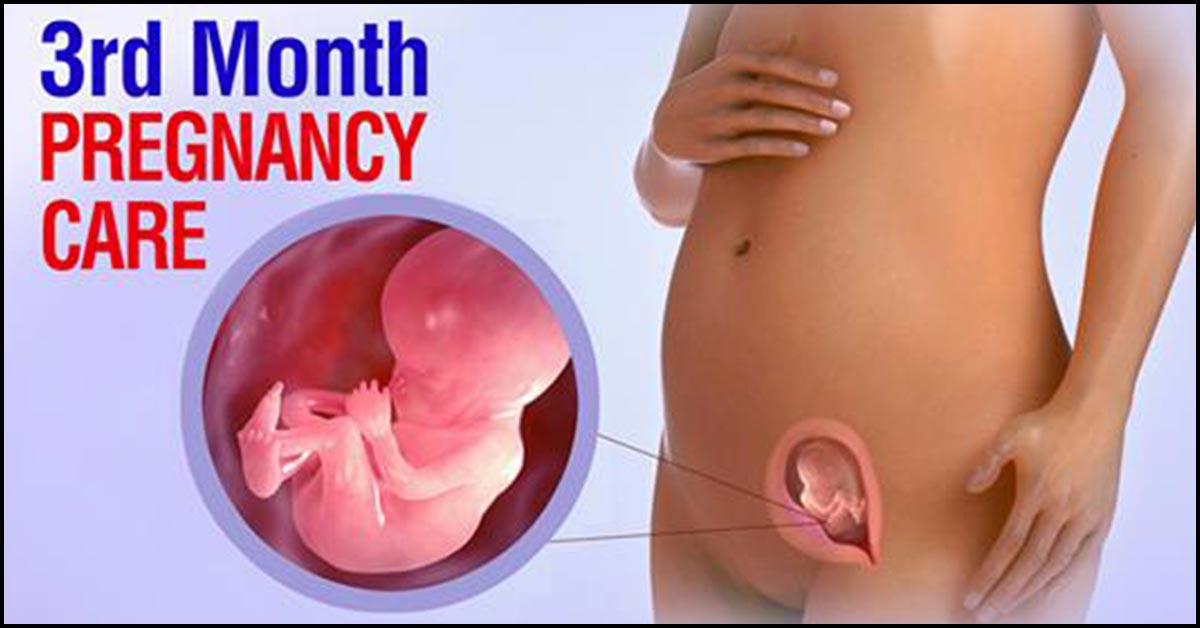 You may need a larger size or a sports bra. Pain in the mammary glands is relieved by a warm shower at the end of the day.
You may need a larger size or a sports bra. Pain in the mammary glands is relieved by a warm shower at the end of the day.
You should definitely see a doctor if:
- the pain is severe
- mammary glands are very dense with redness and body temperature is increased
- discharge from the nipples appears (purulent, bloody)
5. Increased body temperature.
In early pregnancy, an increase in body temperature to 37.5 ° C is not necessary, but is possible due to the peculiarities of the action of progesterone. Because of this, it is difficult for pregnant women to endure stuffy, hot rooms. Self-medication is dangerous: an attempt to bring down the temperature even with a seemingly harmless folk method - tea with raspberries - can mask the true cause of hyperthermia and delay the diagnosis. Due to the increased body temperature, pregnant women should dress in layers and avoid stuffy and hot rooms and spaces so that they can always “adjust” their temperature on their own.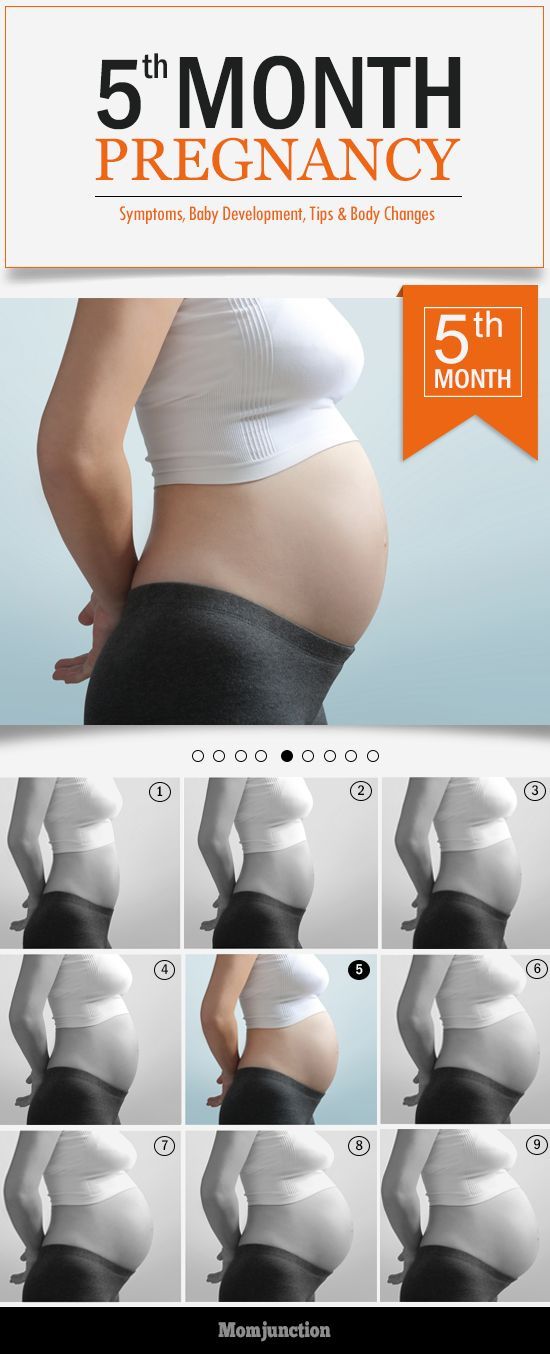
- temperature above 37.5 °C
- along with fever, any pain occurs
- runny nose, cough, body aches appear
6. Nasal congestion, shortness of breath, nosebleeds.
These symptoms can be explained by the individual reaction of the vascular system to the increase in blood volume that occurs during pregnancy. Another possible reason is dry air in the room, the operation of central heating batteries.
Life hack! The easiest way to deal with nasal congestion is to use a humidifier. If you don't have one, you can put a damp towel on the battery - less effective, but better than nothing. It is possible to use sprays with sea salt, but you need to carefully read the instructions and especially the "Indications" section, it should contain information about the safety of the product during pregnancy.
You should definitely see a doctor if:
- symptoms of a cold occur
- nasal congestion accompanied by ear congestion
- these symptoms appeared after exposure to the allergen known to you
7.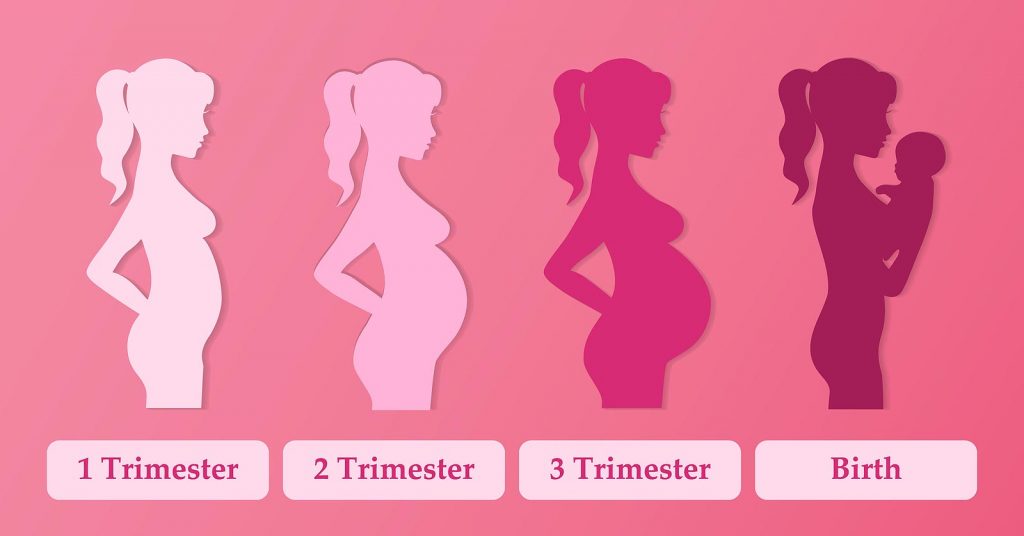 Blood pressure fluctuations.
Blood pressure fluctuations.
The ideal option for the course of any pregnancy is the stability of the blood pressure throughout the gestation. However, this is extremely rare. A small (up to 10 units) increase in pressure from the usual reference may be due to an increase in the load on the cardiovascular system as a result of changes in body weight, hormonal changes, and uterine pressure on the vessels. Normal pressure: systolic below 130 mm Hg, diastolic no more than 85 mm Hg. Blood pressure in the range of 130–139/ 85–89 mm Hg considered high to be normal. High numbers are often observed in patients of older reproductive age, suffering from diabetes mellitus and kidney disease, obesity, etc. However, it is imperative to tell the doctor about all these concomitant pathological conditions at the first appointment and, if necessary, consult a neurologist, cardiologist, endocrinologist and other related specialists . Reasonable physical activity, adherence to sleep and wakefulness, a balanced diet, and the rejection of coffee and strong tea allow you to keep pressure within limits.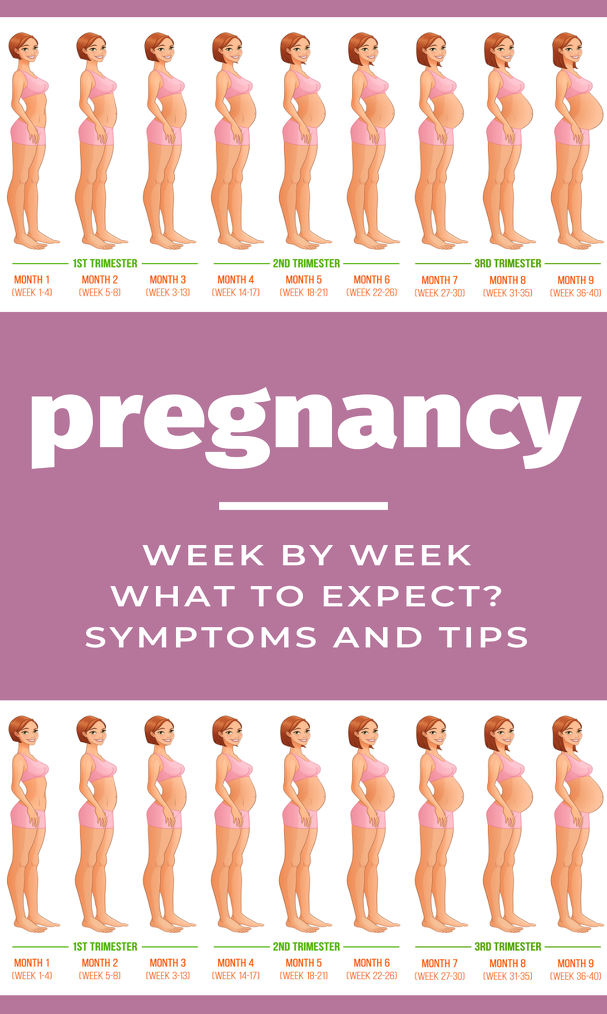 Of the completely exotic for our days, but no less significant - the prevention of stress.
Of the completely exotic for our days, but no less significant - the prevention of stress.
Life hack! If you are experiencing high normal blood pressure for the first time, repeat the measurement after 15 minutes. If the pressure remains elevated, see a doctor.
Be sure to see a doctor if:
- the pressure is above 140/90 mmHg
- pressure increased by more than 10 mm Hg. relative to your usual
- an increase in the pressure indicator is accompanied by edema, the appearance of "flies" before the eyes
NB! You should also pay attention to lowering blood pressure. Numbers less than 90/60 mmHg - an excuse to see a doctor.
Life hack! Keep a blood pressure diary, especially if you are prone to hypertension. Show your diary to your doctor at every appointment.
8. Heaviness and pain in the legs.
Heaviness and pain in the legs, especially in the evening, are frequent companions of pregnancy.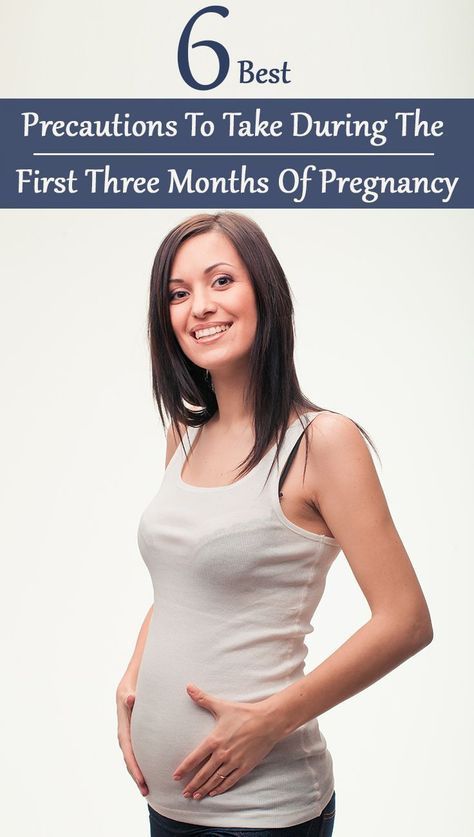 There is an explanation for the occurrence of symptoms: an increase in load due to growing weight and a shift in the center of gravity of the body.
There is an explanation for the occurrence of symptoms: an increase in load due to growing weight and a shift in the center of gravity of the body.
Life hack! Ask your partner/husband to give you a foot massage, relax with your limbs elevated (not too much!) A therapeutic pedicure, dousing the legs with cool water, a contrast shower, a cream or gel for legs with cooling components (menthol, essential oils), as well as compression stockings or stockings of the lightest degree of compression will help.
Be sure to see a doctor if:
- one or both legs are severely swollen or discolored
- previously diagnosed varicose veins, family history of thrombosis
9. Skin changes.
During pregnancy, you may notice dark spots on your skin. Especially often such darkening (hyperpigmentation) is observed in the nipple area, along the white line of the abdomen. Stretch marks (stretch marks) may appear on the skin of the abdomen and thighs.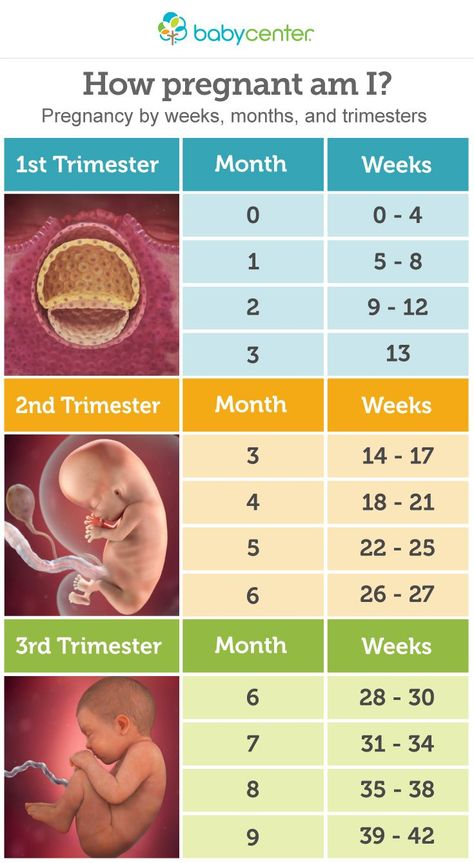 These are normal signs and do not require any treatment. In most cases, skin color will return to normal after breastfeeding ends, and stretch marks will shrink and fade. Itching can be associated with stretching of the skin, especially in the abdomen and mammary glands. This symptom occurs infrequently and is usually successfully stopped by the use of special products to moisturize and soften the skin. By the way, these same remedies usually help in the fight against stretch marks.
These are normal signs and do not require any treatment. In most cases, skin color will return to normal after breastfeeding ends, and stretch marks will shrink and fade. Itching can be associated with stretching of the skin, especially in the abdomen and mammary glands. This symptom occurs infrequently and is usually successfully stopped by the use of special products to moisturize and soften the skin. By the way, these same remedies usually help in the fight against stretch marks.
Life hack! Oils and moisturizing creams to increase skin elasticity, contrast showers, massage with a hard brush will help reduce the likelihood of skin changes.
You should definitely consult a doctor if:
- along with itching there are areas of redness, spots, peeling
- itching increases
10. Bleeding gums.
Changes in the characteristics of blood circulation in the body of a pregnant woman can cause bleeding gums.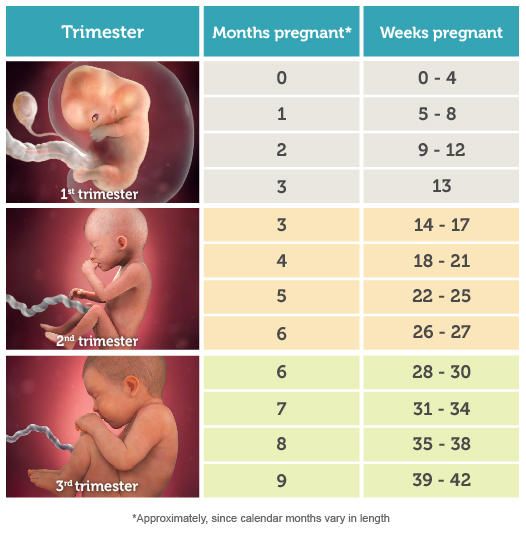 The appearance of minor blood impurities during brushing your teeth, when eating solid foods (for example, an apple) is acceptable. However, the key provision is "insignificant". If you find it difficult to assess your own condition, consult a specialist.
The appearance of minor blood impurities during brushing your teeth, when eating solid foods (for example, an apple) is acceptable. However, the key provision is "insignificant". If you find it difficult to assess your own condition, consult a specialist.
You should definitely consult a doctor if:
- you have loose teeth, sore gums, bad breath
- the amount of bleeding in the gum area increases
11. Fatigue, mood instability.
Tearfulness, lack of strength, forgetfulness, distraction, the whole palette of feelings "here and now"... The list can be continued, and there is only one explanation for this - pregnancy. The most common early symptom is severe fatigue. There is no universal recipe, just as there is no single picture of these states. The main recommendation for all pregnant women is to rest often, relax and even sleep during the day. Most importantly, you need to remember: pregnancy is not a disease, but a great time to prepare for motherhood.

